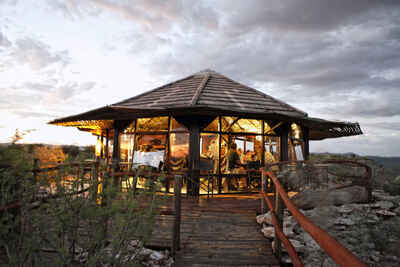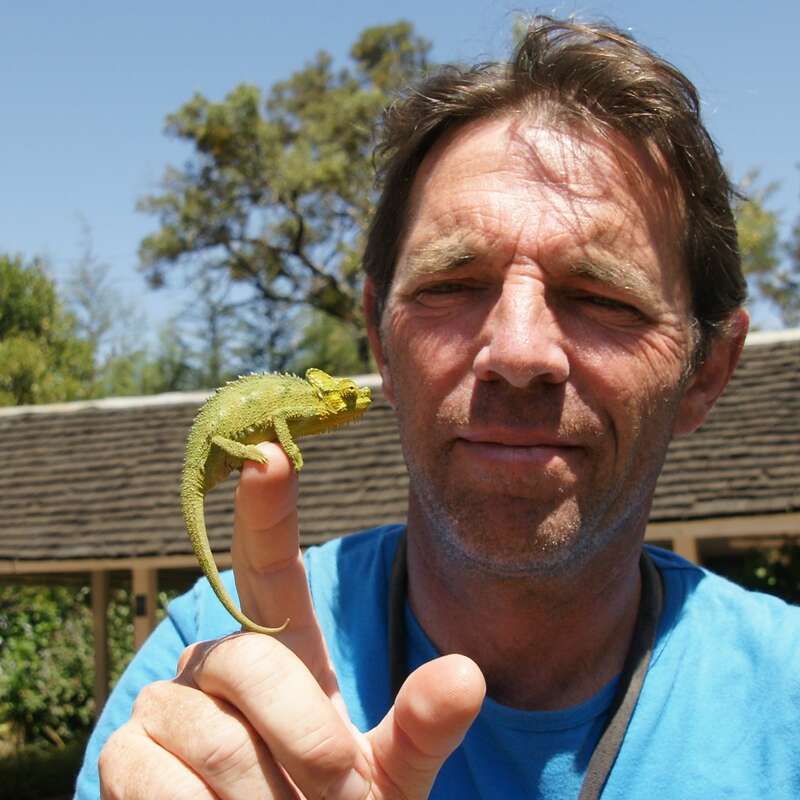About Vingerklip Lodge
Vingerklip Lodge sits at the foot of a stunning rocky plateau, one of the Ugab terraces, which towers above the lodge.
From the many vantage points at the lodge guests can enjoy spectacular views of the surrounding sandstone mountains and valleys, as well as the eponymous Vingerklip, a striking 35m high ‘finger of rock’.
Vingerklip Lodge is stylish and friendly with good facilities and an incredible setting from a geological perspective. Although it’s some distance from Twyfelfontain and some of the more popular attractions in Damaraland the vistas and landscape make driving to the lodge an activity in its own right. We think this lodge is an interesting place to stay off the beaten track in an already isolated part of Namibia.
Our view
Vingerklip Lodge is stylish and friendly with good facilities and an incredible setting from a geological perspective. Although it’s some distance from Twyfelfontain and some of the more popular attractions in Damaraland the vistas and landscape make driving to the lodge an activity in its own right. We think this lodge is an interesting place to stay off the beaten track in an already isolated part of Namibia.
Accommodation
25 bungalows
Children
Fine for 8+.
Open
All year
Activities

4WD Safari

Cultural excursion

Guided walking safari

Private activities

Self-guided walking
Traveller reviews of Vingerklip Lodge
21 real, un-edited reviews from Expert Africa's travellers.
Arrived 21 Nov 2022, 1 nights
"Vingerklip Lodge review"
Overall rating: Excellent
Arrived 24 Oct 2019, 1 nights
"Picturesque"
Overall rating: Excellent
Arrived 20 Jul 2019, 1 nights
"Great views, rock formations"
Overall rating: Good
Arrived 27 Mar 2018, 1 nights
"Views like Monument Valley, good hotel"
Overall rating: Good
Arrived 28 Sep 2017, 1 nights
"Vinger klip Ugh"
Overall rating: Terrible
Arrived 20 Jul 2017, 1 nights
"Vingerklip Lodge review"
Overall rating: Excellent
Arrived 21 Jul 2016, 1 nights
"Vingerklip Lodge"
Overall rating: Average
Arrived 28 Sep 2015, 2 nights
"Vingerklip Lodge review"
Overall rating: Excellent
Arrived 4 Oct 2014, 1 nights
"Stunning location"
Overall rating: Good
Arrived 19 Nov 2013, 1 nights
"Vingerklip Lodge review"
Overall rating: Average
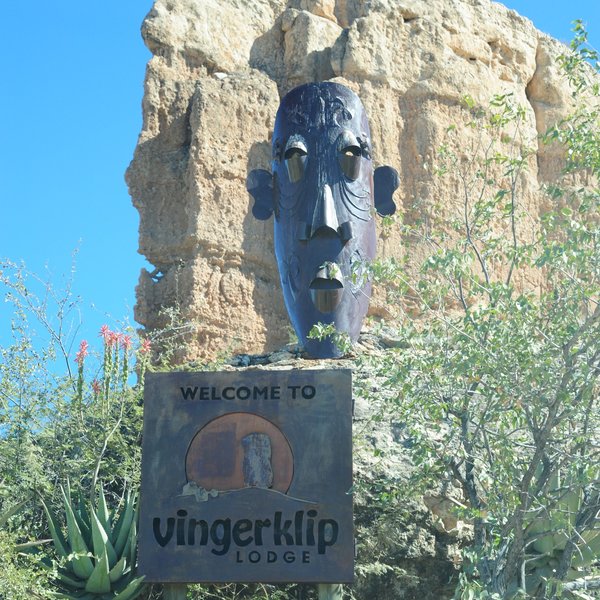
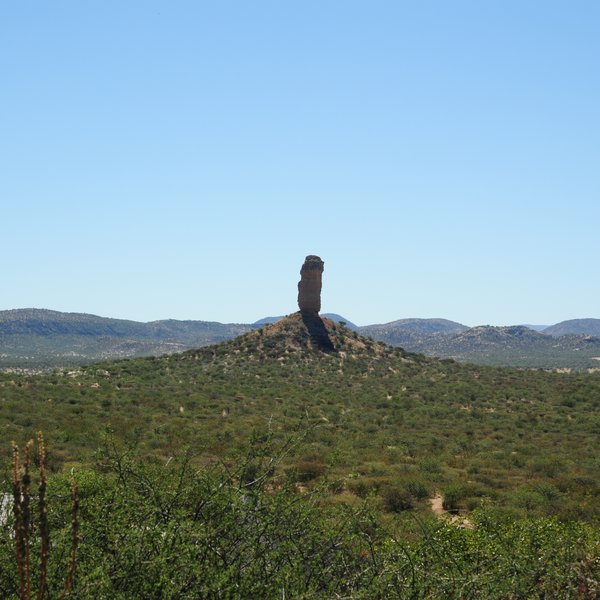
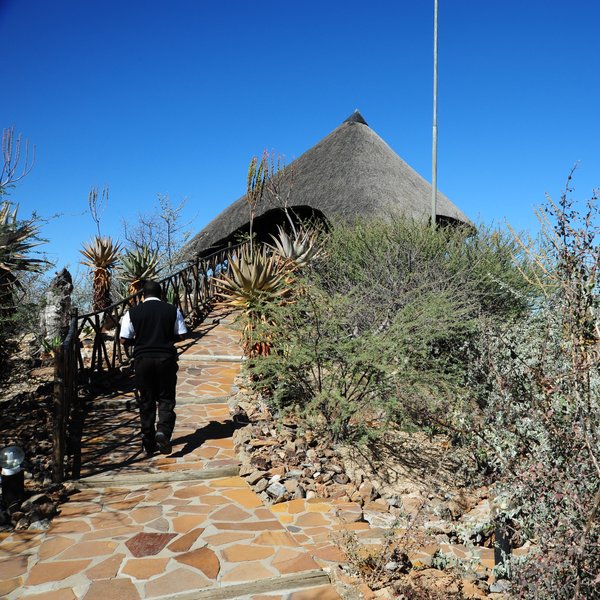
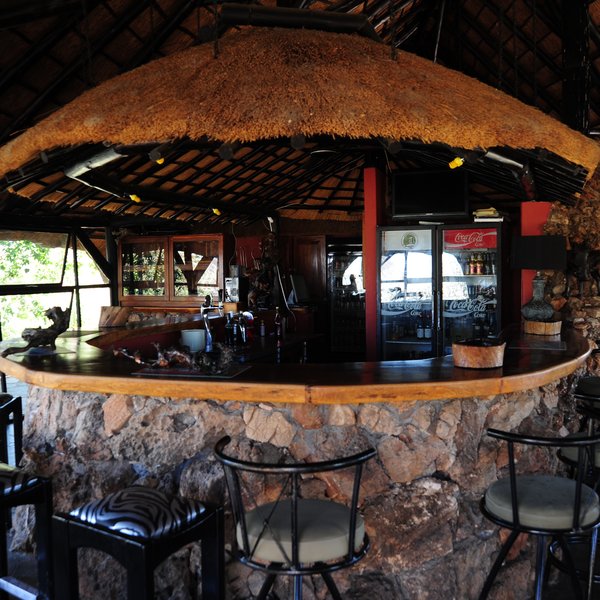
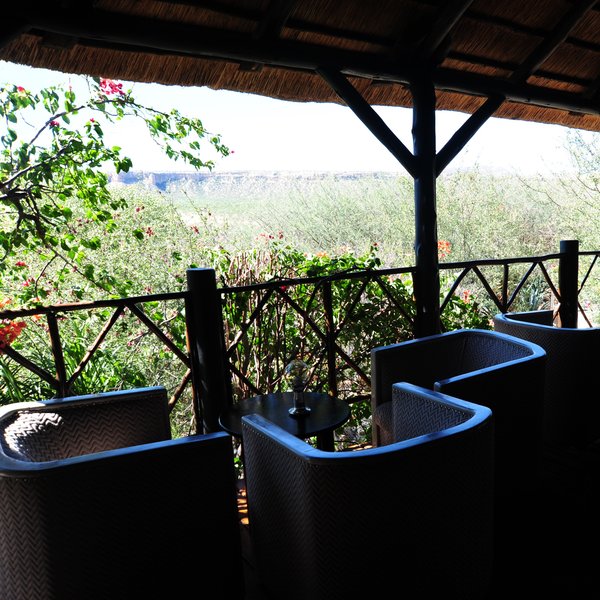
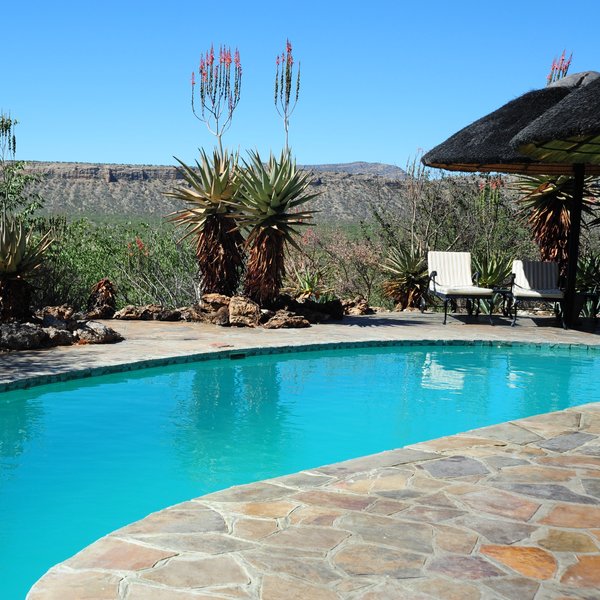
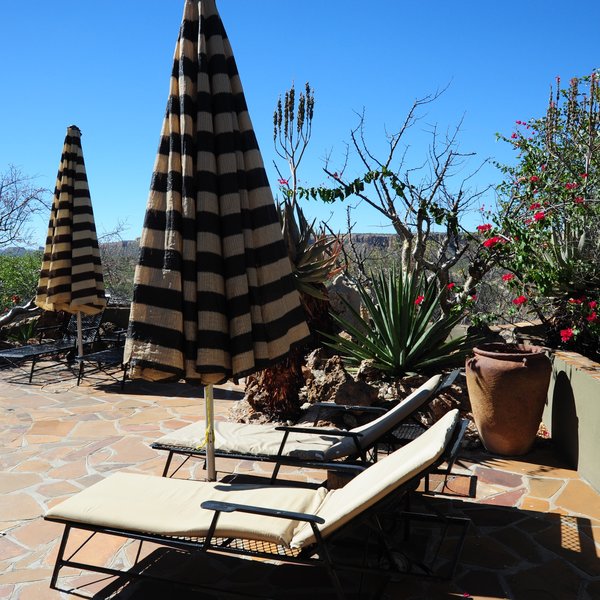
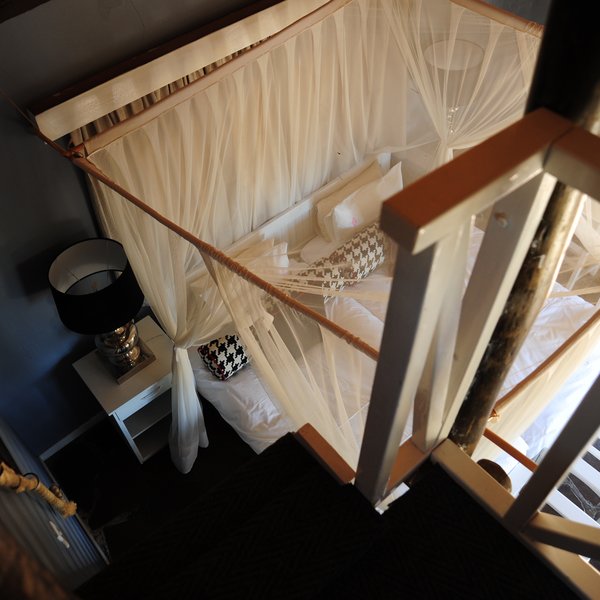
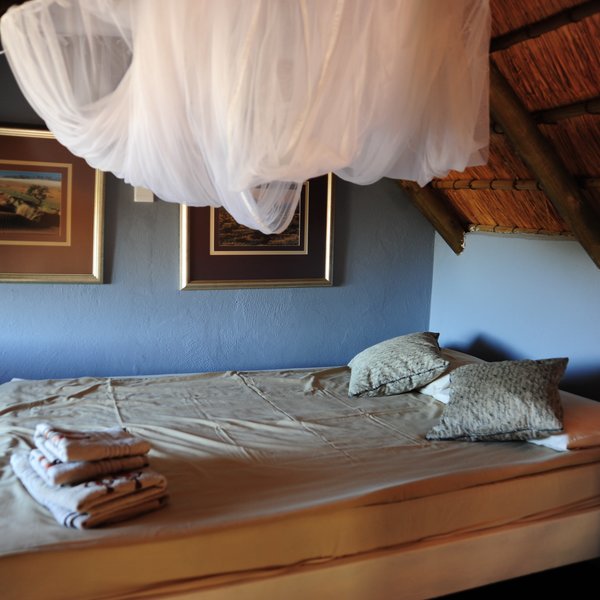
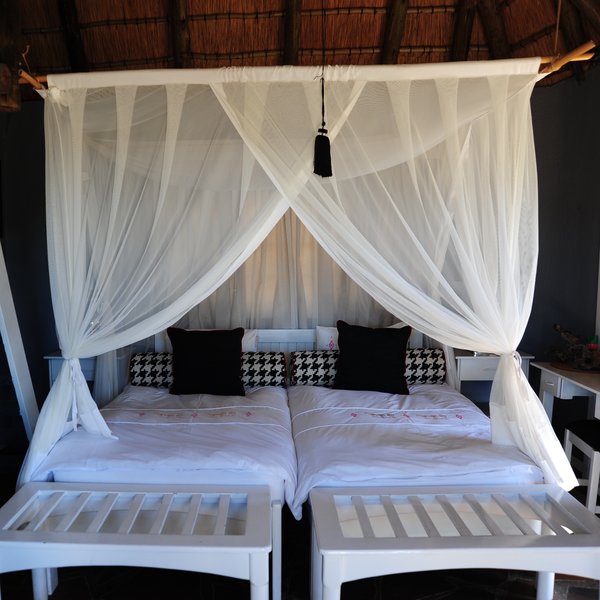
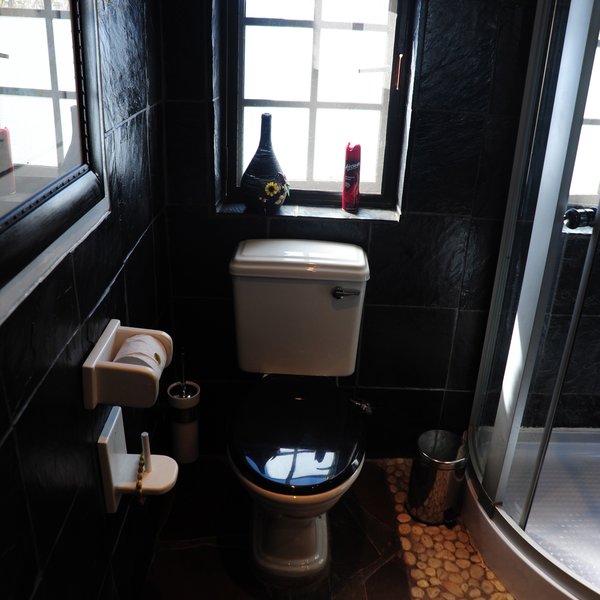
Expert Africa's gallery
When we travel we take lots of photos ourselves to give you a real and un-edited view of the safaris. See our 19 pictures of Vingerklip Lodge to get the candid view.
View galleryVingerklip Lodge: Our full report
Vingerklip Lodge sits at the foot of a stunning rocky plateau, one of the Ugab terraces, which towers above the lodge.
From the many vantage points at the lodge guests can enjoy spectacular views of the surrounding sandstone mountains and valleys, as well as the eponymous Vingerklip, a striking 35m high ‘finger of rock’.
From a pretty landscaped garden, steps lead up to Vingerklip’s main building, housing the reception, curio shop, restaurant, bar and lounge. This main area is largely open sided, and open plan, under a high thatched roof; it's airy and cool, but a little dark. A well-stocked bar,lies to one side of the reception, along with a lounge area with plenty of seating and views over the bush. To the other side is the restaurant, with individual tables and a large central fireplace. Outside, Vingerklip Lodge makes good use of its hilltop location, with terraced seating areas strategically placed on several levels. A shaded deck alongside the main building, is a perfect spot for sundowners. In between are two swimming pools: one large and U-shaped; the second, smaller. Both have sunloungers and umbrellas offering some welcome shade. Added extras are a jacuzzi, with a bar conveniently next to it, and a fitness room.
The lodge sits below a huge sandstone plateau, the vertical walls of which loom over Vingerklip. Those with a head for heights can climb up here using a steep winding footpath followed by several flights of metal steps. The views from the top are incredible though and are well worth the climb, with a 360o viewing platform and firepit perched on the edge of the cliff making for one of the most memorable sundowner spots we’ve found in Namibia. Luckily cold drinks are available up here from the bar at the Eagle’s Nest Restaurant which also serves barbeque dinners with a view. This is a spectacular spot for dinner and is unsurprisingly very popular but with limited spots. If you are keen to eat up here we would strongly suggest reserving your spot before your trip.
Vingerklip's 25 bungalows, with whitewashed walls, thatched roofs and private terraces, are perched in pairs along the hillside, linked by stone and concrete pathways. Inside, the décor is modern, with cool grey/blue walls, and black and white furniture, and some unfortunately mismatched chrome fittings. Animal skins brighten the flagstone floor, and black-and-white dogtooth bolsters add style to the white sheets and black cushions on the bed. The rooms are sophisticated, with interesting bedside lamps, and cool black-and-white armchairs in front of large wardrobes. You can also expect double or twin beds, a white wooden dressing table with a large mirror, air conditioning, mosquito nets, and a safe for locking away valuables. Two 'luxury' units also have a small kitchen. The en-suite bathrooms have twin sinks, a shower and huge mirror and a seperate toilet.
Eight of the bungalows are designed for families, with a loft that can accommodate two children. Here you'll find twin beds with mosquito nets, a pair of armchairs and a table with a great view of the bush. Note, however, that the stairs are very steep, almost a ladder, and although there is a rope handrail, and a railing around the top, there is nothing to stop a child falling down the stairs. Thus we wouldn't recommend them for young children.
The pinnacle of Vingerklip's accommodation options is an exclusive and secluded bungalow, 'Heaven's Gate', perched up alongside the Eagle's Nest restaurant. It, too, is accessible only via a short mountain walk, followed by a 25m climb up a metal staircase. Not for the faint hearted!
Vingerklip Lodge offers a number of activities. A signposted walk from the lodge to the Vingerklip takes around an hour. There are also marked walks around the northern or southern terrace, each taking around two hours, which you can do alone, or with a guide. Nature drives, sundowner trips and visits to a Himba village in the area can also be arranged.
Geographics
- Location
- Damaraland, Namibia
- Ideal length of stay
- Vingerklip Lodge makes a good one-night stopover between Etosha and central Damaraland.
- Directions
- Vingerklip Lodge is situated about halfway between Khorixas and Outjo, on the D2743 road.
- Accessible by
- Self-drive
Food & drink
- Usual board basis
- Half Board
- Food quality
- Breakfast, lunch and dinner are served as buffets in the main area, with a barbecue dinner usually available at the Eagle’s Nest. Guests at Heaven’s Gate also have their breakfast in the Eagle’s Nest.
- Dining style
- Individual Tables
- Dining locations
- Indoor and Outdoor Dining
- Further dining info, including room service
- No
Children
- Attitude towards children
- Families with children are welcome at Vingerklip Lodge.
- Equipment
- There are family bungalows with a loft room for children, although access is not suitable for the very young.
- Generally recommended for children
- Vingerklip Lodge is built on several different levels, with uneven paths and un-supervised pools – so it’s better suited to older children.
- Notes
- Vingerklip Lodge is built on several different levels, with some uneven pathways and unfenced pools, making it better suited to older children. Children should be fine as long as they are under supervision at all times.
Communications
- Power supply notes
- Back-up generator
- Communications
- There is free WiFi for guests.
- TV & radio
- No.
- Water supply
- Borehole
Health & safety
- Malarial protection recommended
- Yes
- Medical care
- The closest doctor or clinic is in Khorixas but facilities in Outjo would be much better.
- Dangerous animals
- Low Risk
- Security measures
- There are security guards on duty day and night.
- Fire safety
Activities
4WD Safari
Cultural excursion
Guided walking safari
Private activities
Self-guided walking
Extras
- Disabled access
- Not Possible
- Laundry facilities
- Laundry is available at an extra cost.
- Money
- There are safes in every room.
Plan and book your trip with Expert Africa
All of our trips are tailor-made, so we'll always adapt them to suit you. Talk to an Expert and let us plan and arrange your perfect trip.

Talk to an Expert
Call or email us now! We’ll match you with the Specialist in our team who is best suited to help you. Then together we can start planning your trip.

Set up your itinerary
Based on our experience and your ideas, your specialist will create a detailed, costed itinerary. We’ll refine it together, until we have a trip that you’re perfectly happy with.

Prepare for your trip
The same Specialist will make the seamless arrangements for your trip, send you detailed travel documents, and be available to answer any questions before you depart.

Travel with peace of mind
After you set off, you’ll be cared for by our partners in Africa, most of whom have worked with Expert Africa for decades. And if you ever need us urgently, we’re available 24/7.

When you return
We love to learn about your trip, and so will always be grateful if you’ve the time to give feedback to your Specialist when you return.
Vingerklip Lodge's location
Look closer at the environment and surroundings of Vingerklip Lodge.
Other lodges in Damaraland
Alternative places to stay in this same area.
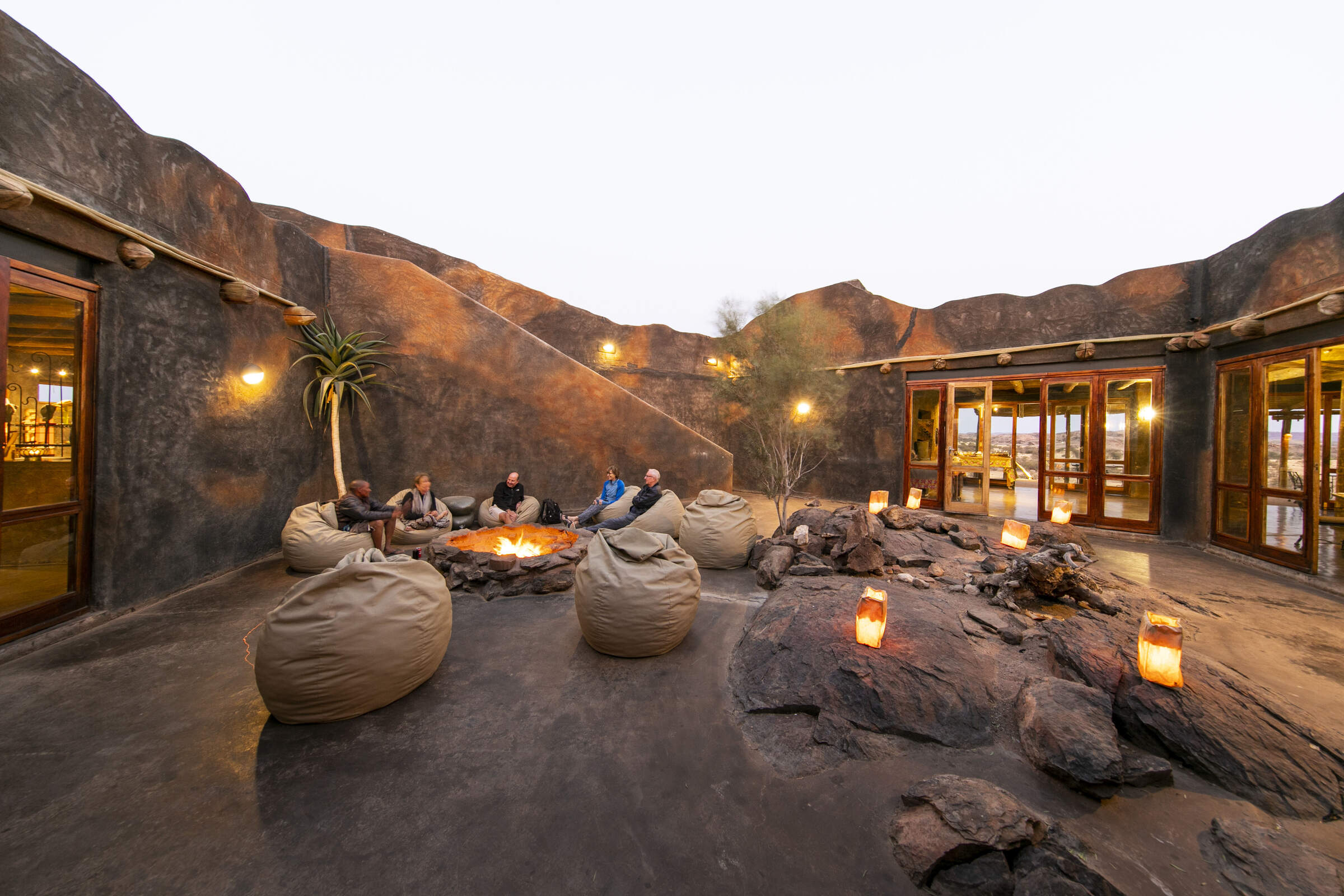
Doro Nawas
Comfortable rooms and a convenient location make the community run Doro Nawas a great base for exploring Damaraland.
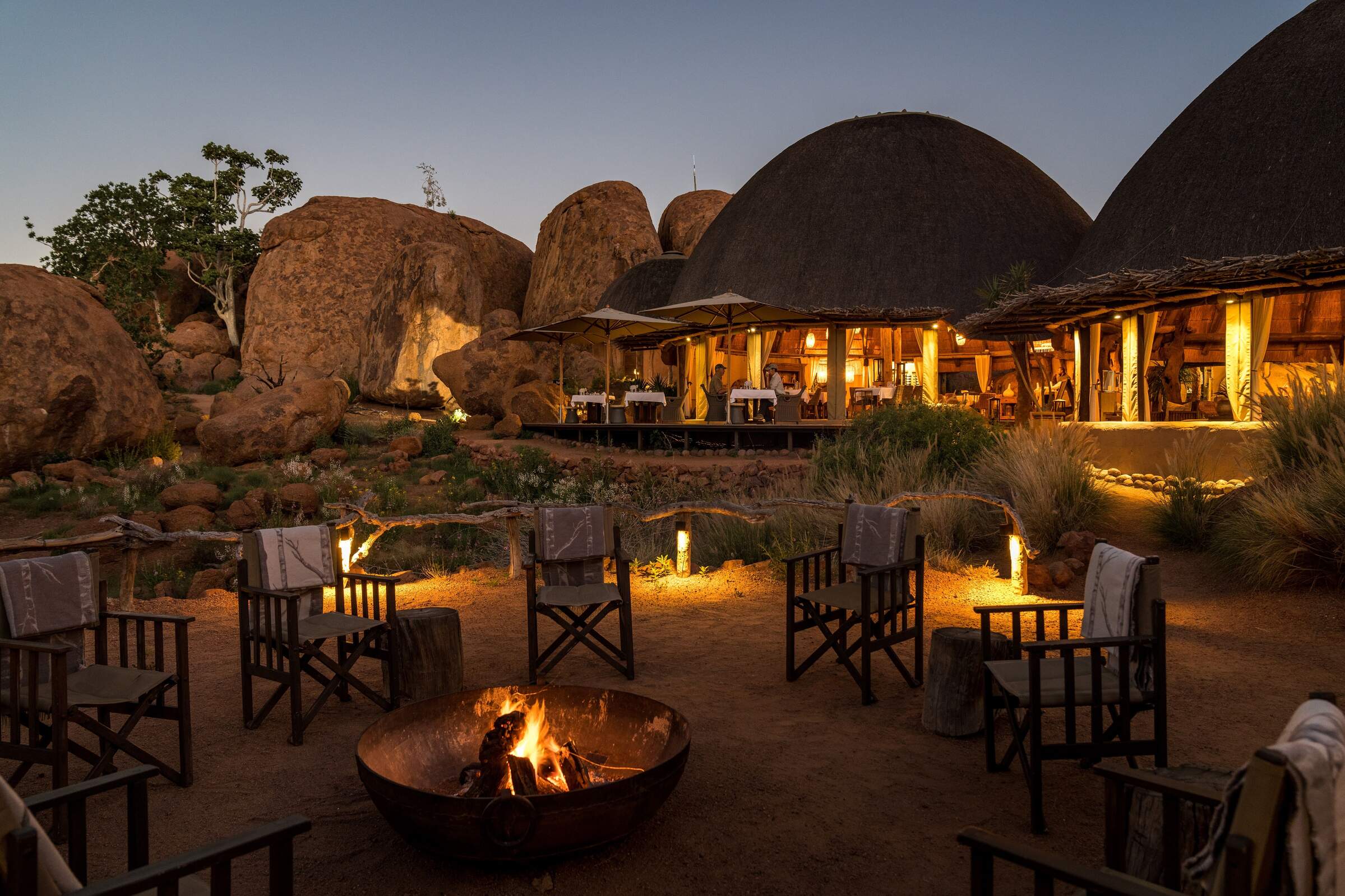
Mowani Mountain Camp
Mowani is a beautiful and stylish mountain retreat in southern Damaraland; it makes a great base for visits toTwyfelfontein.
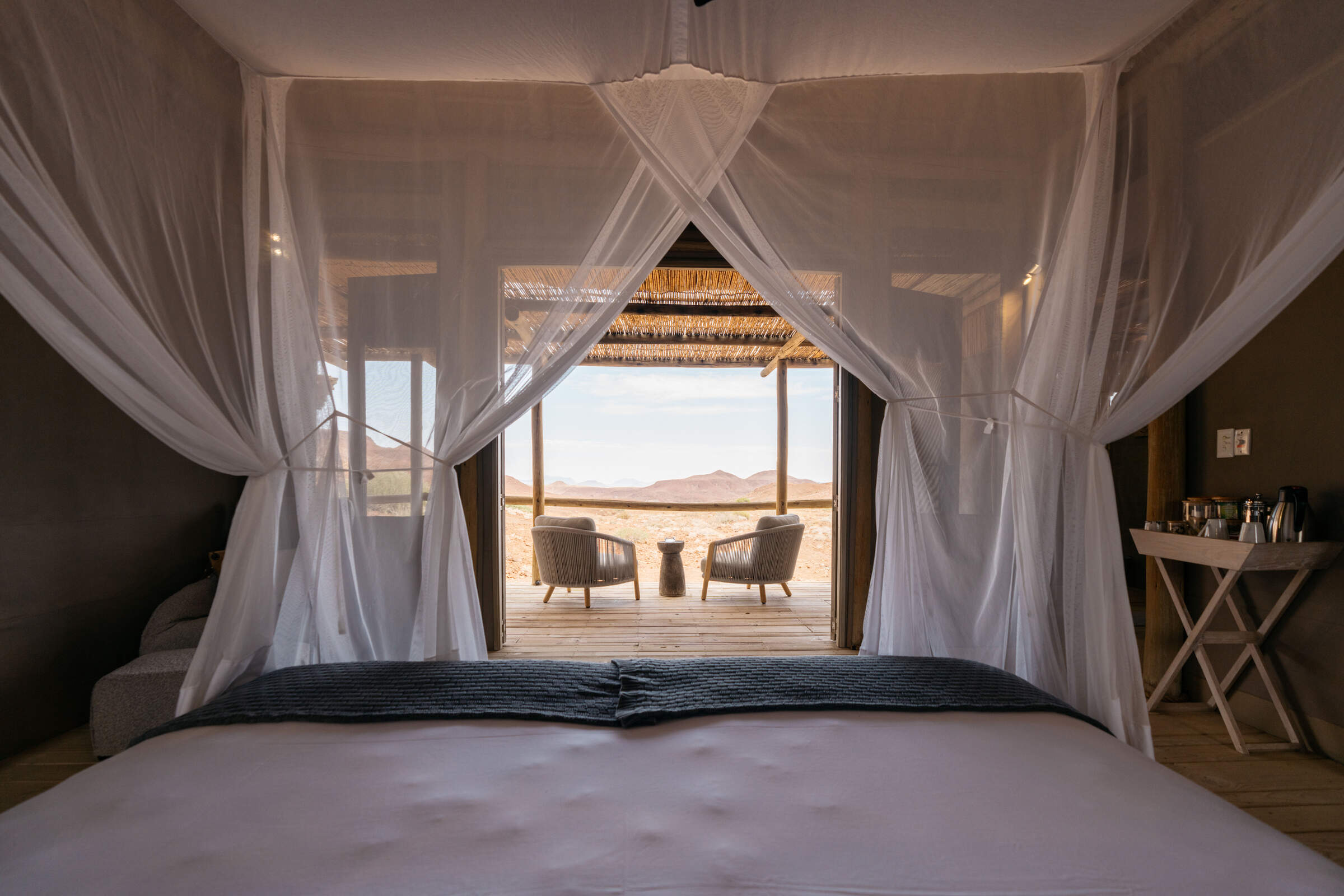
Damaraland Camp
Setting the standard for community partnerships, Damaraland Camp offers a beautiful location, a range of activities – and a genuine welcome.
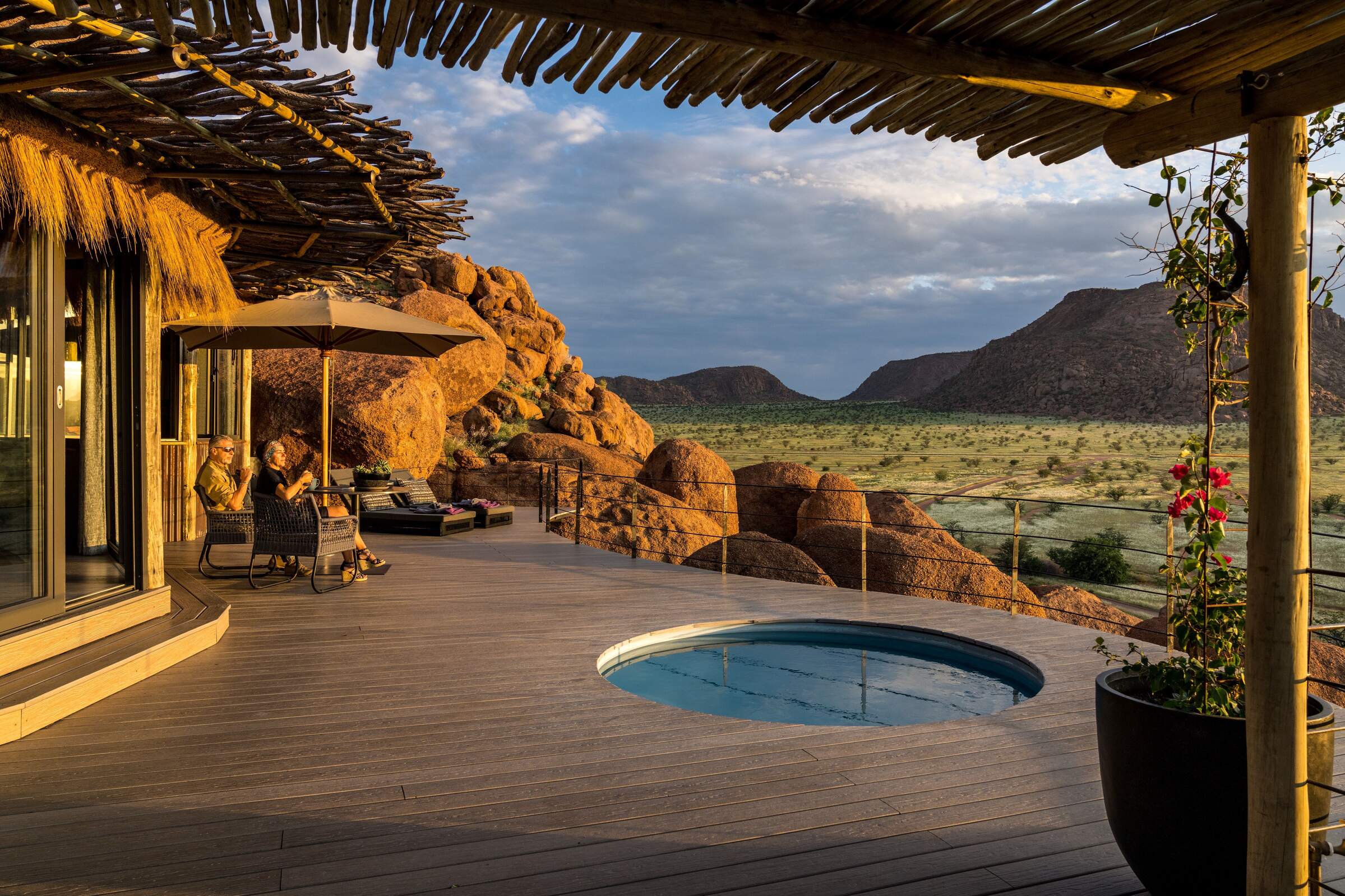
Camp Kipwe
With unusual, igloo-like rooms, open-air bathrooms and beautiful scenery, Camp Kipwe is well placed for nature and cultural excursions.
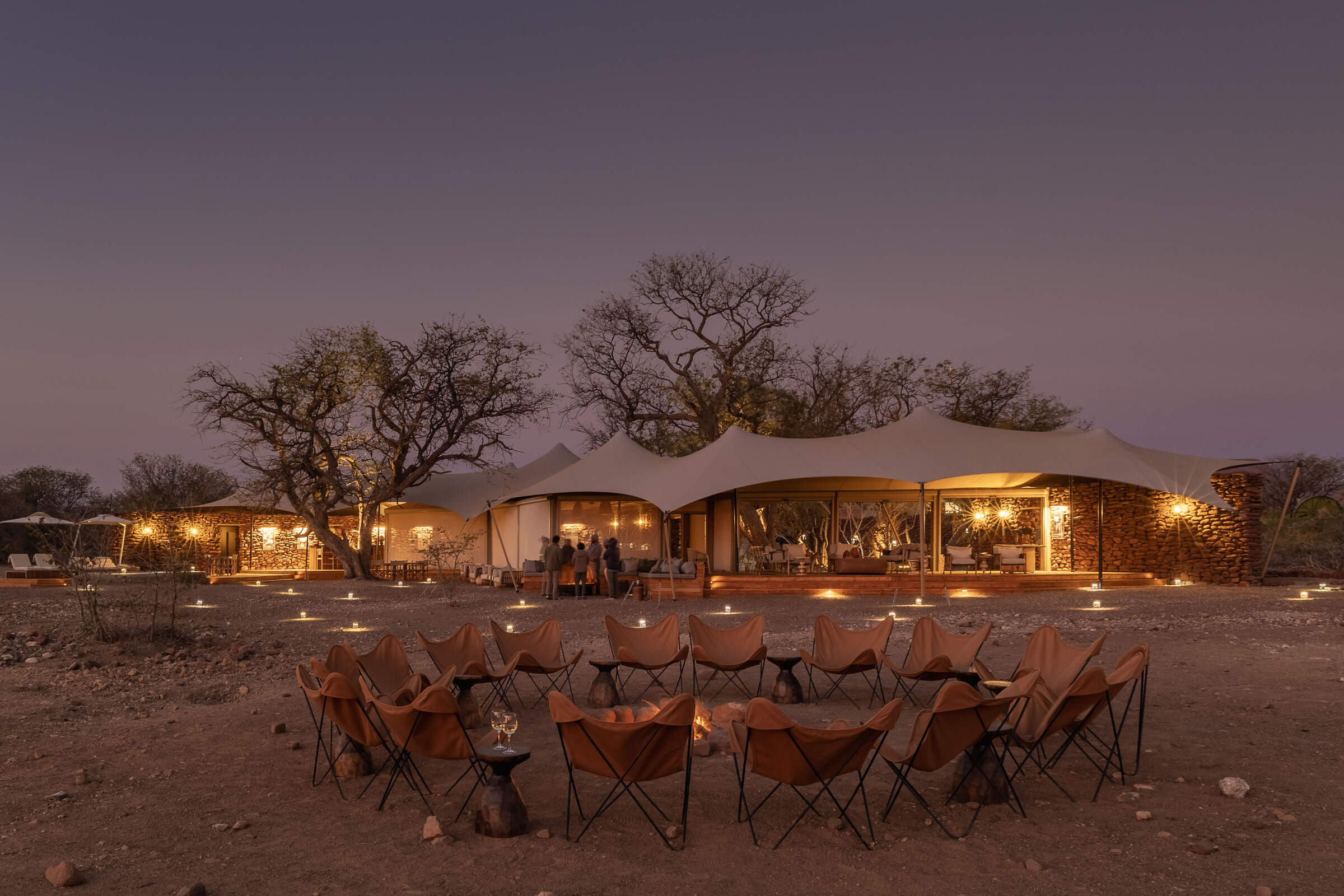
Desert Rhino Camp
Desert Rhino Camp offers a rare opportunity to track black rhino on foot in one of the last true wilderness areas – an amazing experience.
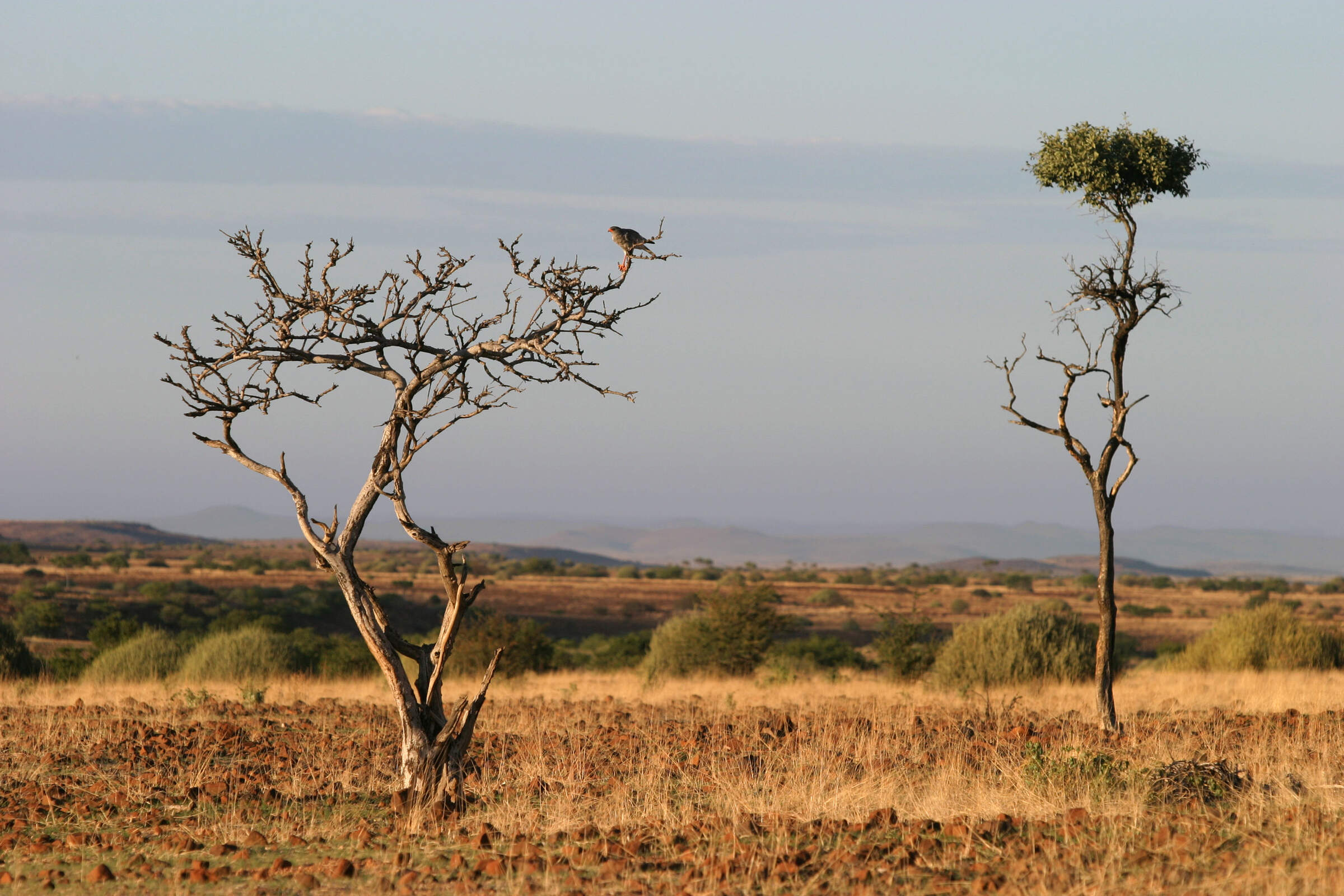
Etendeka Camp
Etendeka is an owner-run camp in the remote and less visited north of Damaraland. The camp is renowned for it's spectacular guided walking trails.
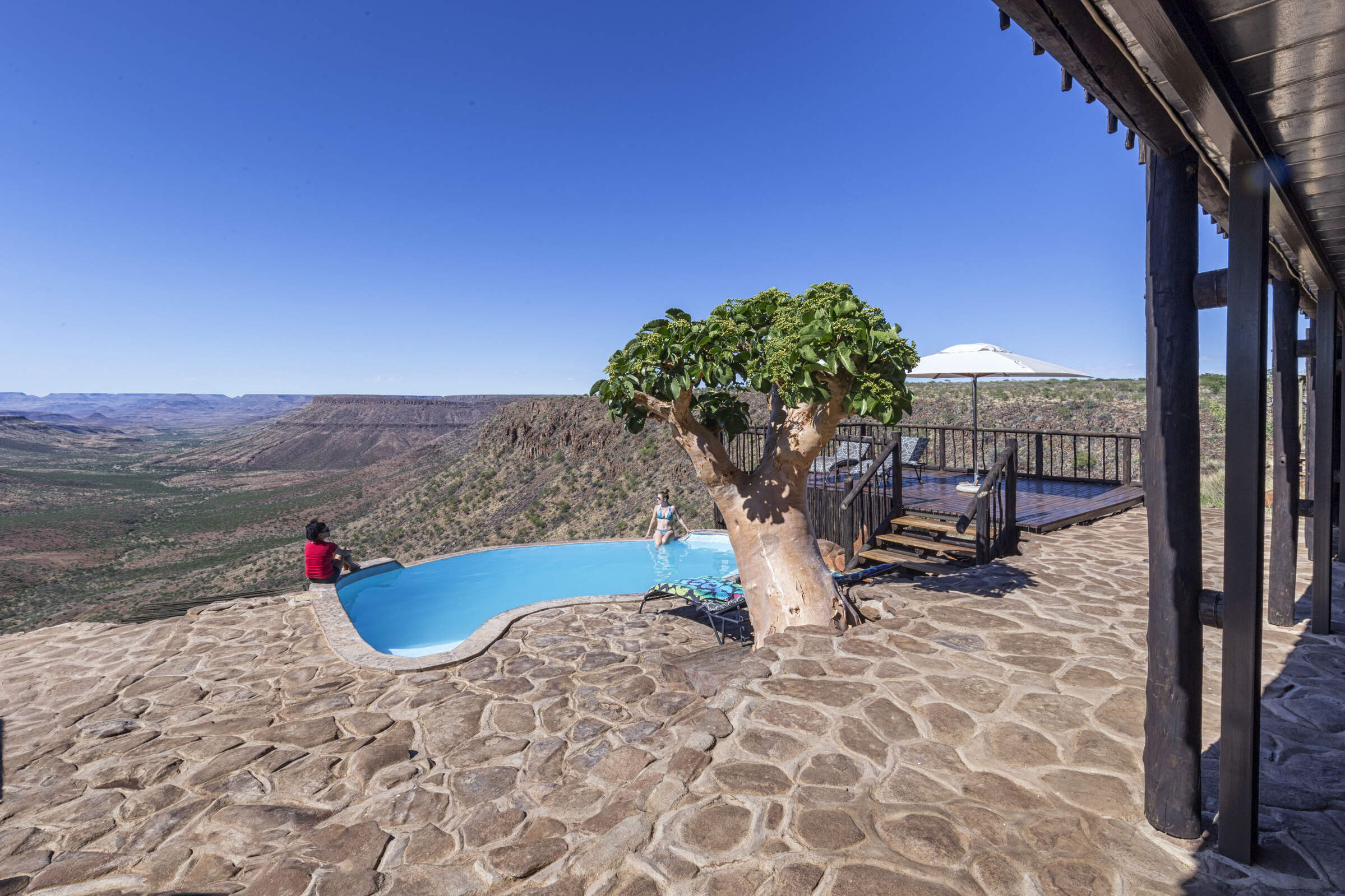
Grootberg Lodge
On the edge of an ancient plateau Grootberg Lodge has a stunning location and arguably the best views of any lodge in Namibia.
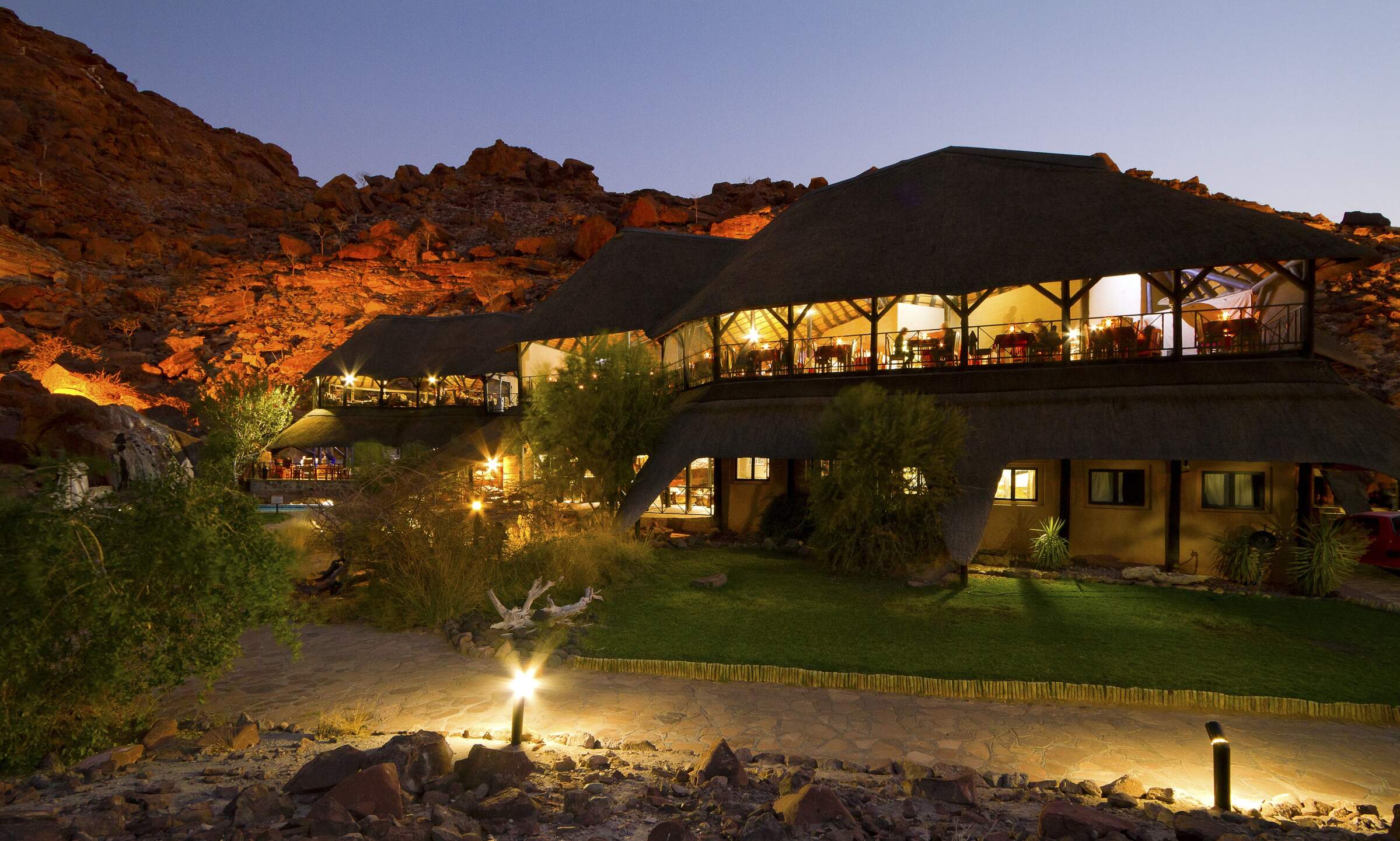
Twyfelfontein C'try Lod.
A large lodge set among the rocks, Twyfelfontein Country Lodge is a convenient base for visiting the rock engravings, which are only 4km away.
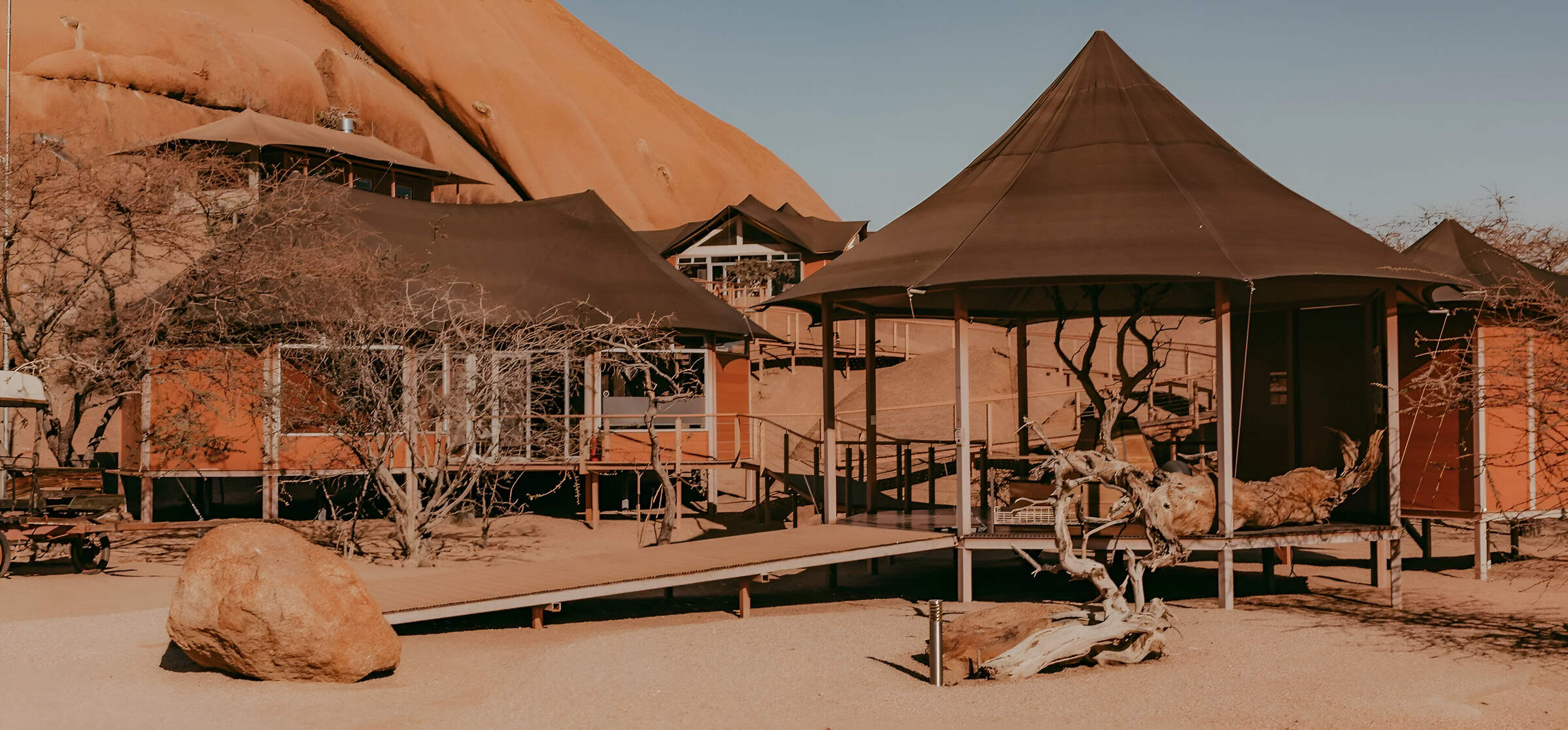
Spitzkoppen Lodge
Spitzkoppen Lodge provides stylish accommodation in an area of scenic grandeur with guided access to sites of ancient Bushman rock art.
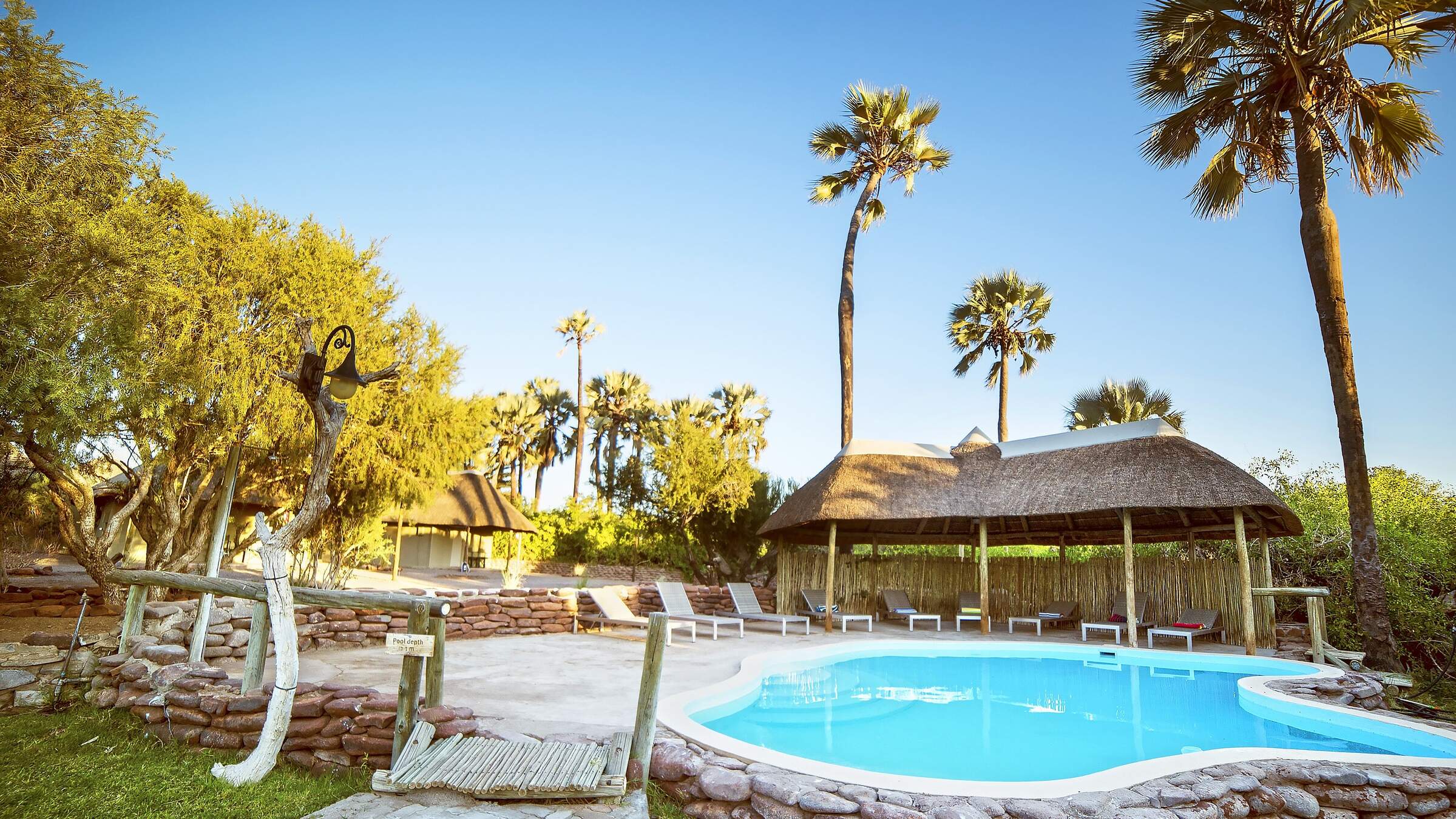
Palmwag Lodge
Palmwag Lodge has a great location by a spring in the Uniab River and offers access to an area where you can see a variety of desert-dwelling animals.
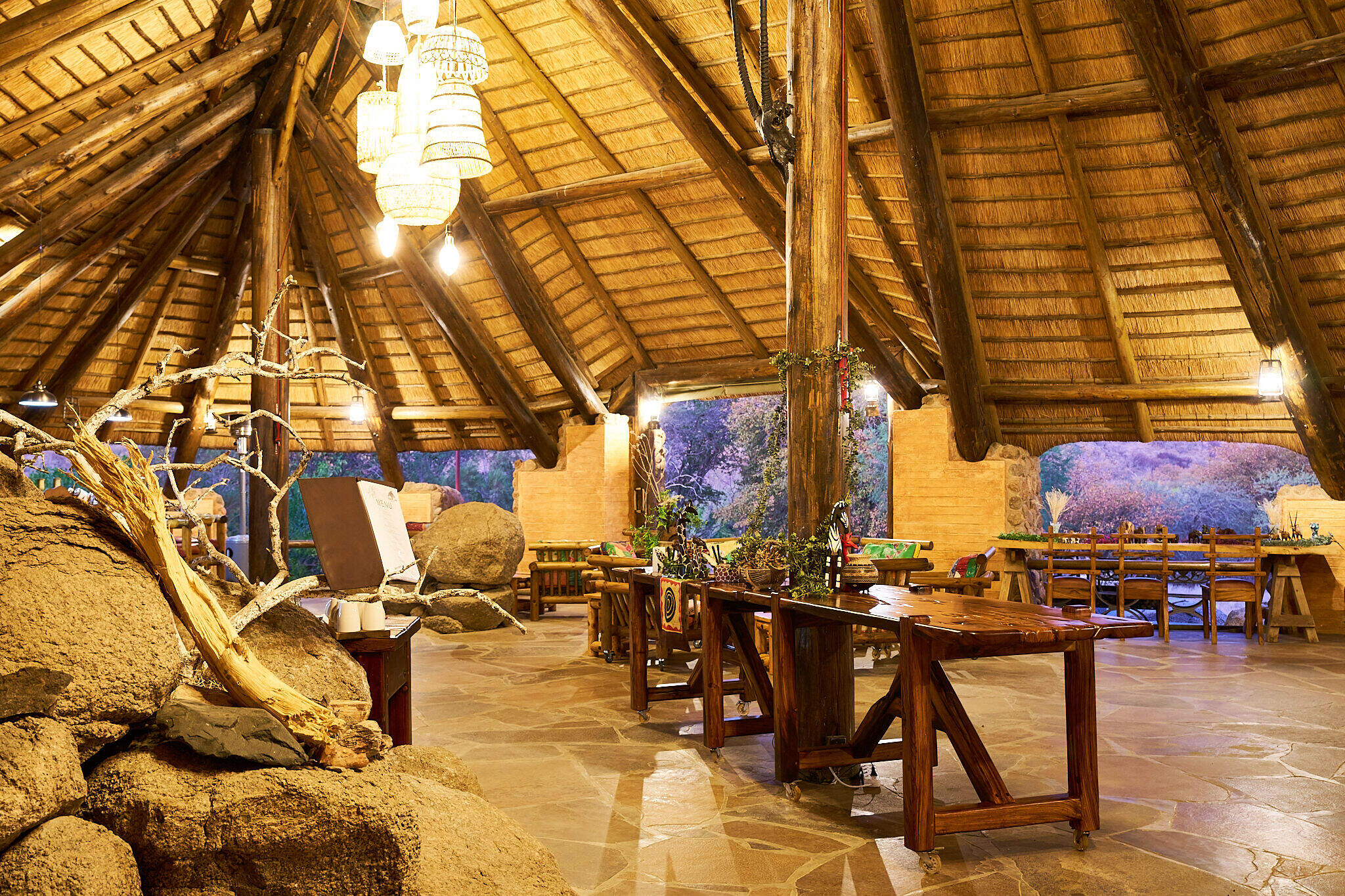
Huab Lodge
Huab is a classic little Namibian Lodge which is slightly off the beaten track in a lesser visited part of Damaraland.
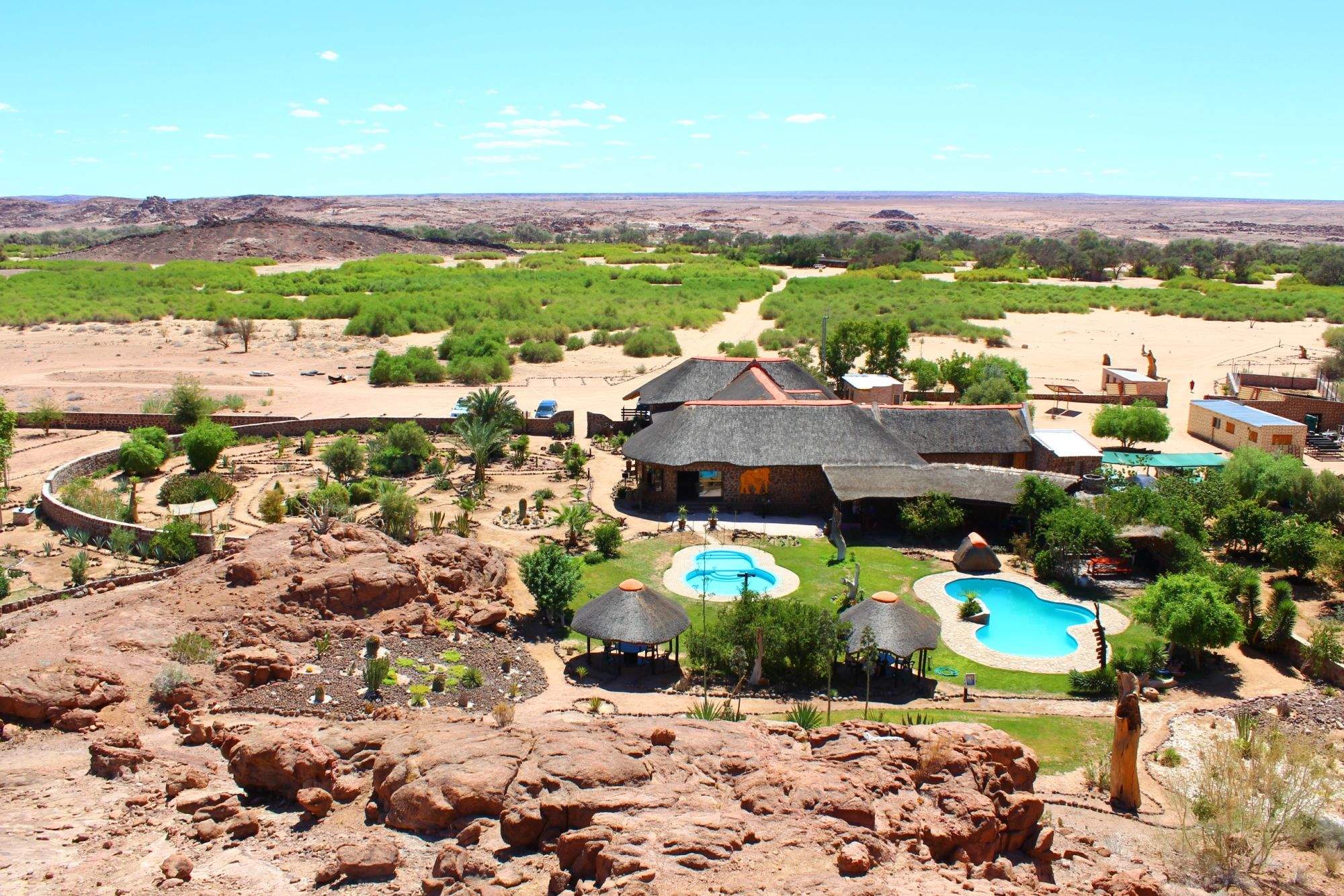
Brandberg White Lady
Brandberg White Lady Lodge, nestled at the foot of its namesake, makes a good base from which to visit bushman rock paintings including the 'White Lady'.
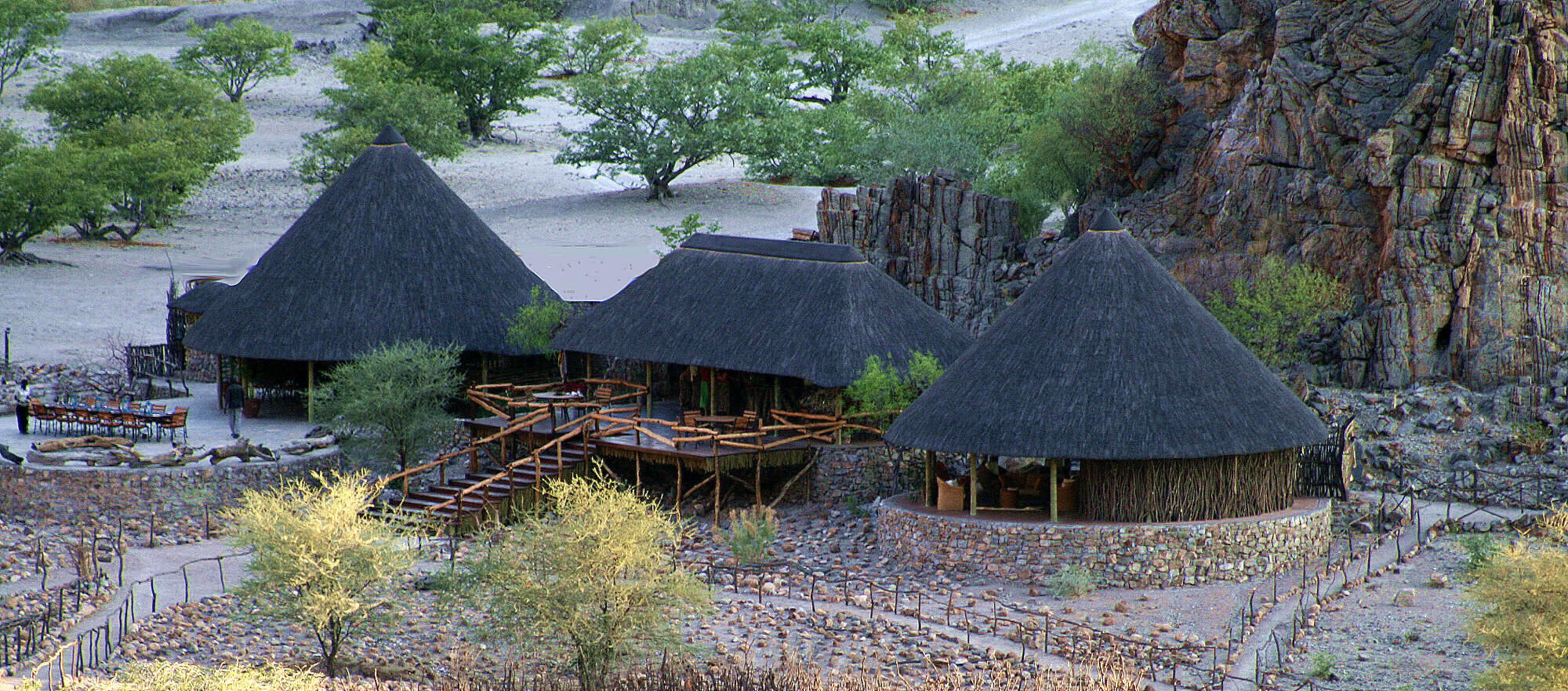
Khowarib Lodge
Khowarib Lodge has a great location overlooking the Hoanib River. This is one of the few places to offer authentic Himba village visits.
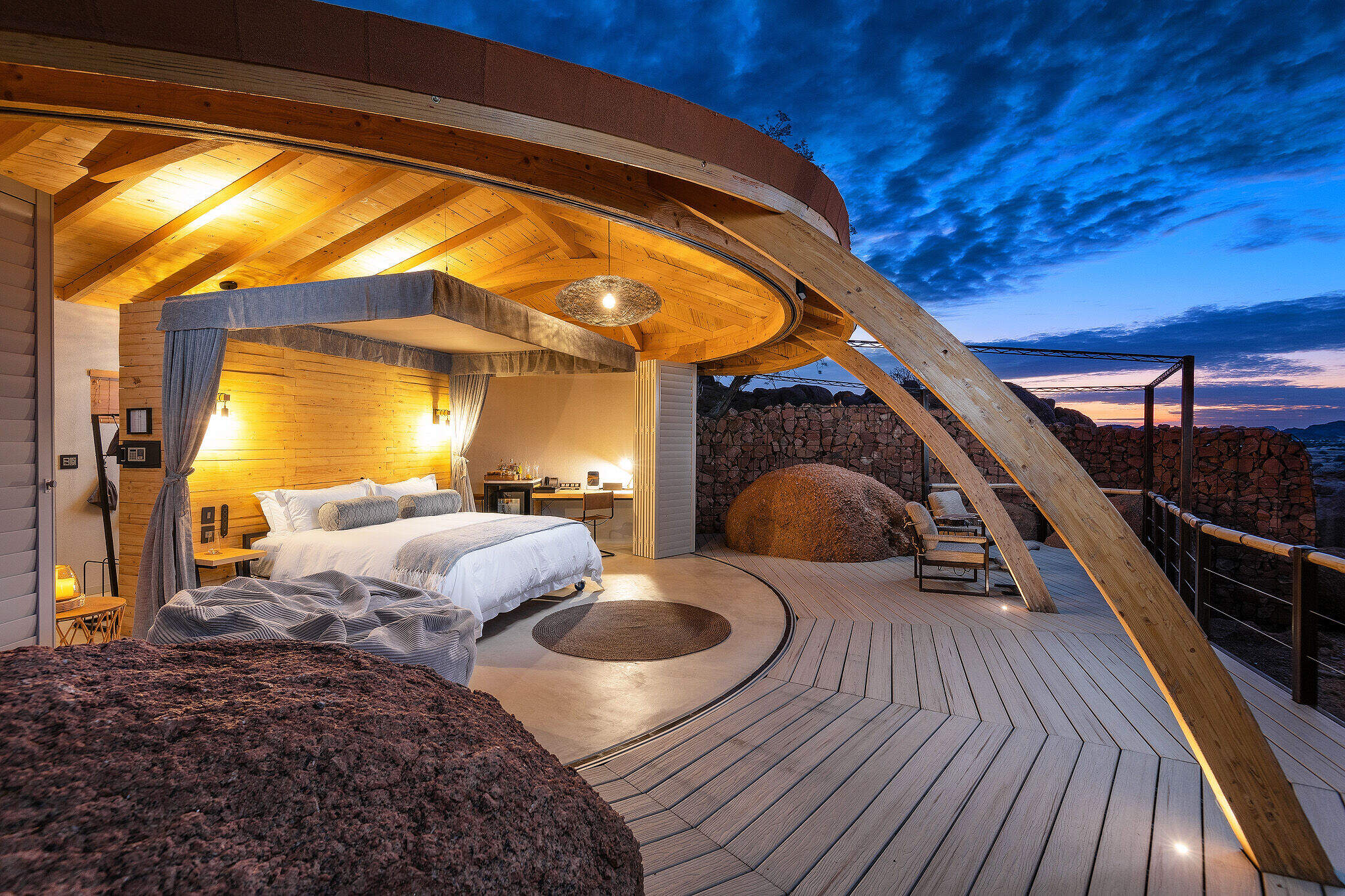
Onduli Ridge
Onduli Ridge is a luxurious, low-impact luxury camp offering top-notch guiding in a remote wilderness area of Damaraland.
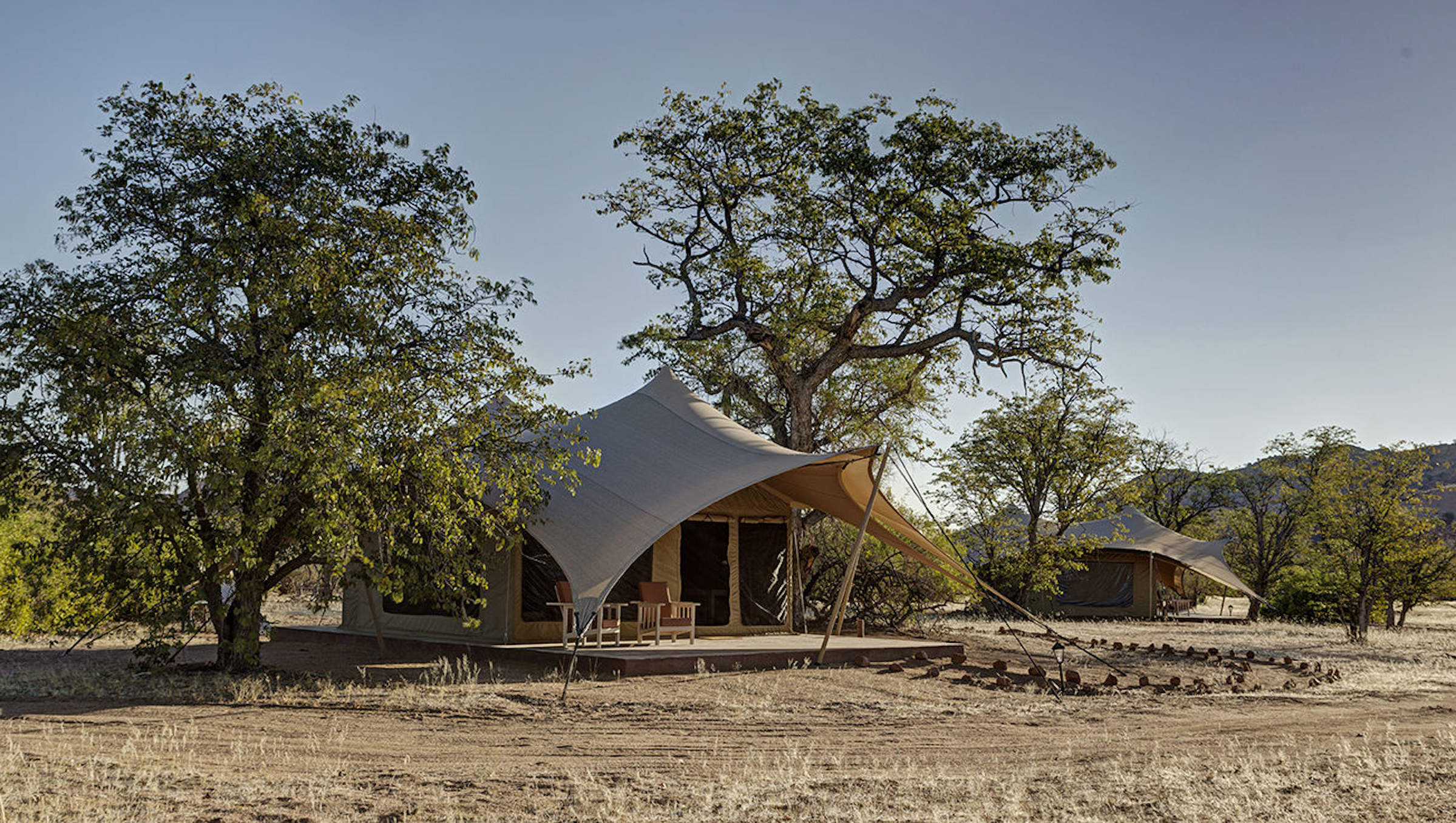
Malansrus Camp
Within easy reach of Twyfelfontein, Malansrus offers a simple but comfortable base for visits to the rock engravings or seek out desert-adapted elephants.
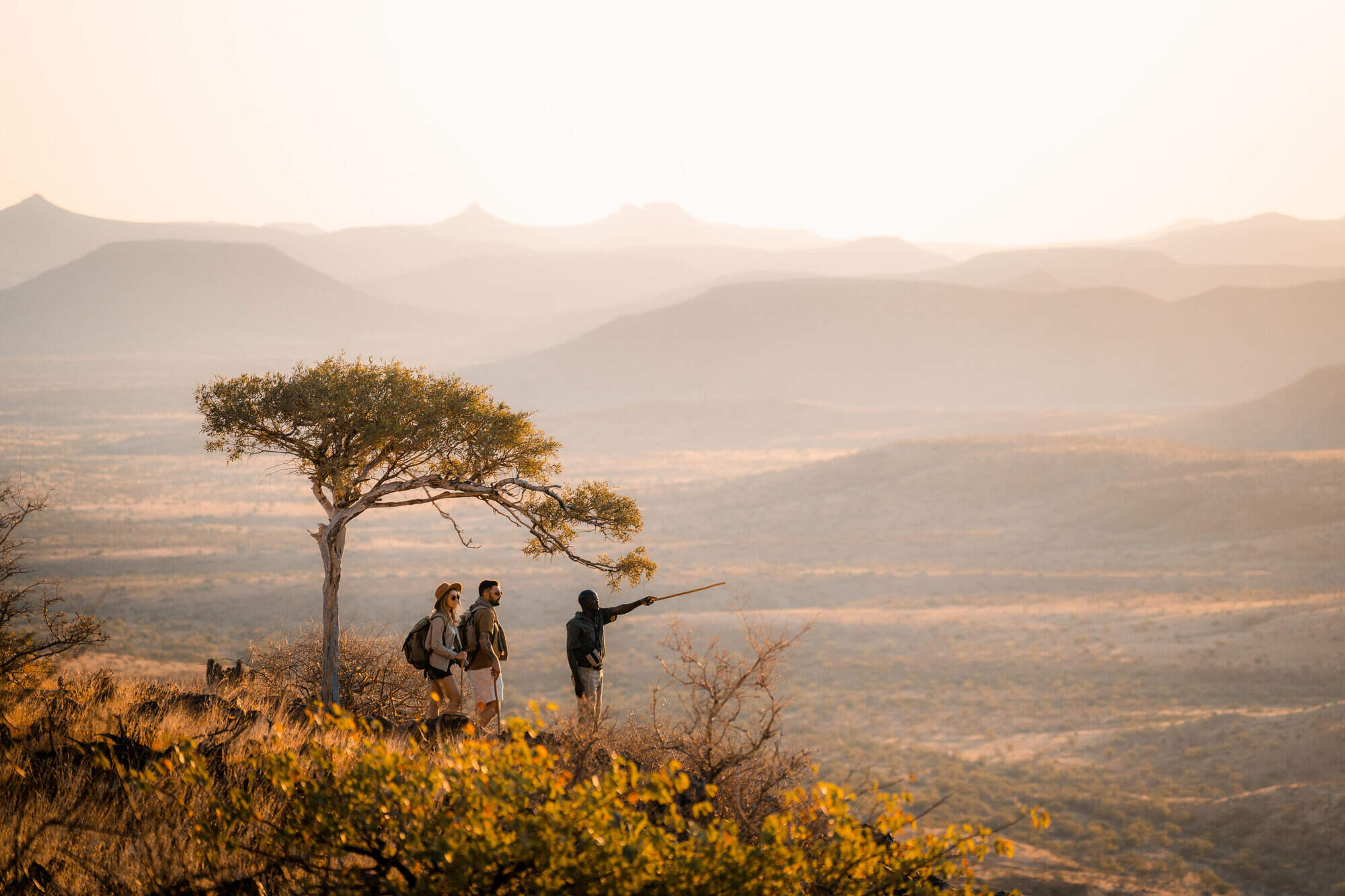
Etendeka Walking Trail
The Etendeka Walking Trail promises to offer a back-to-basics walking and camping experience in one of Namibia's most remote and untouched wilderness areas.
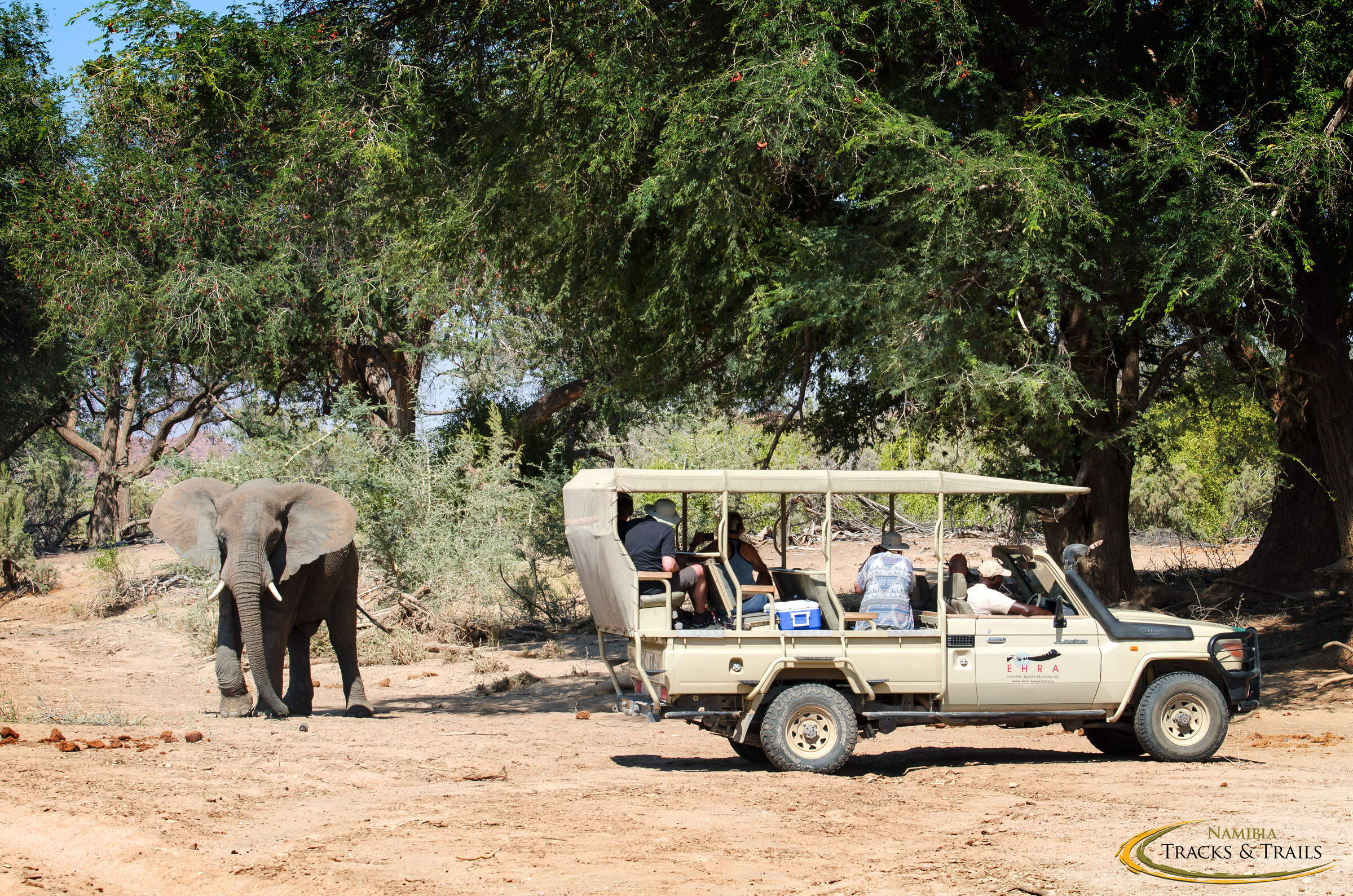
Ozondjou Trails
The simple Ozondjou Trails gives a unique perspective on living with Damaraland’s desert-adapted elephants and how tourism is key to protecting them and the livelihood of the people.
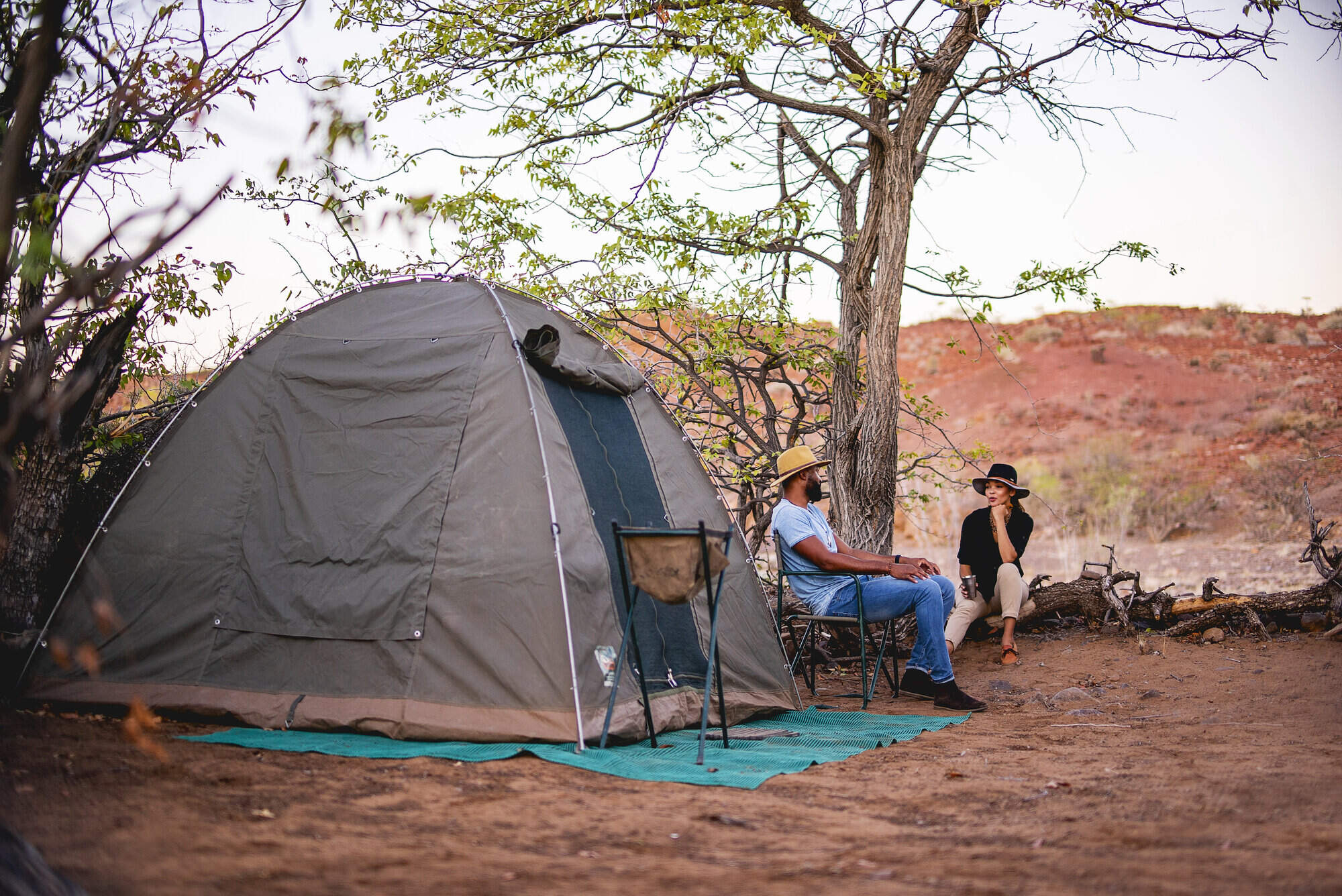
Palmwag Sleep-out
Palmwag Sleep-out is a simple camping experience and a great way to enjoy the remote beauty of the vast Palmwag Concession
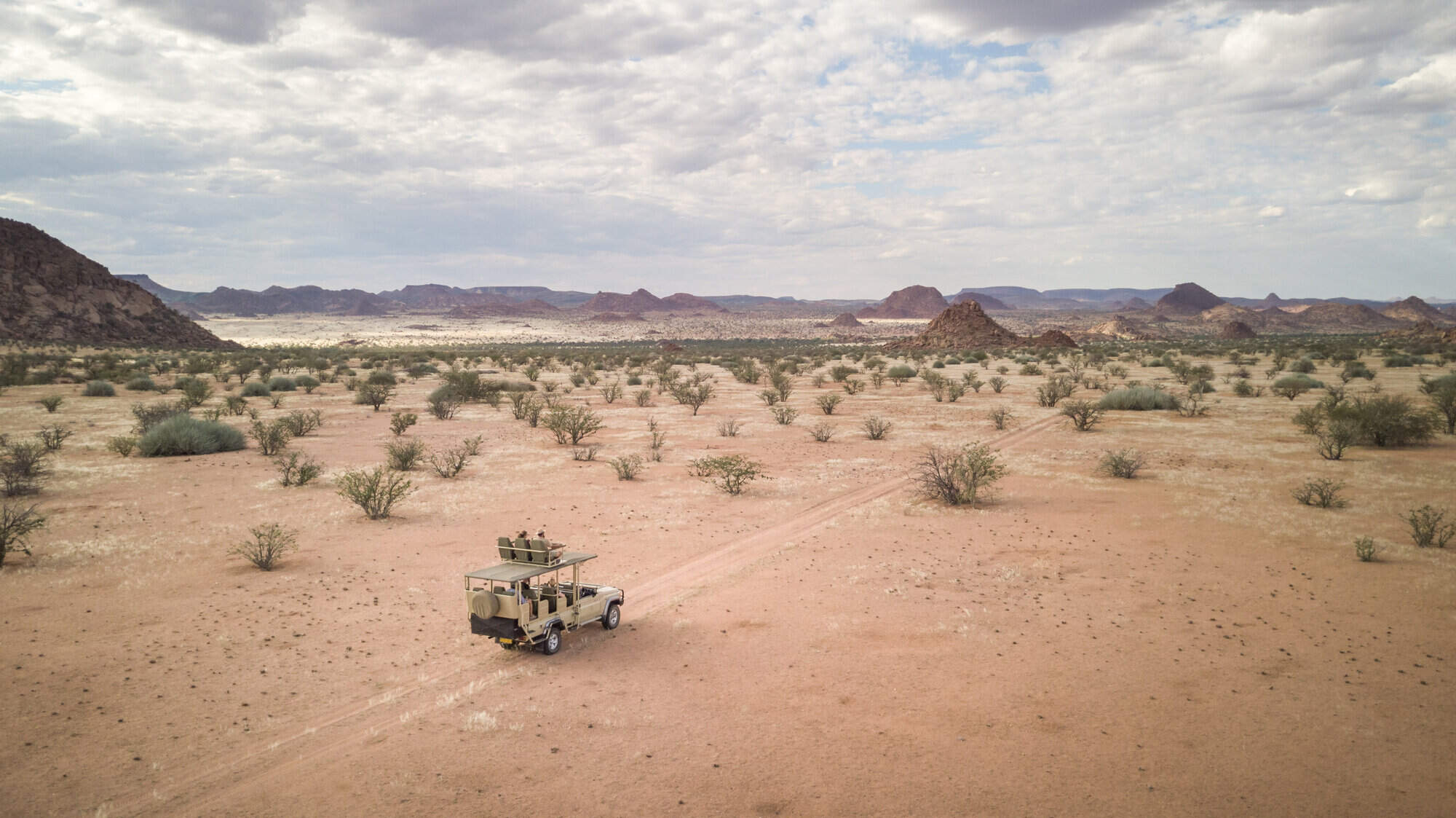
Camp Doros
Small, intimate and with excellent eco-credentials, Camp Doros is set above an ephemeral river within a remote community concession of Damaraland.
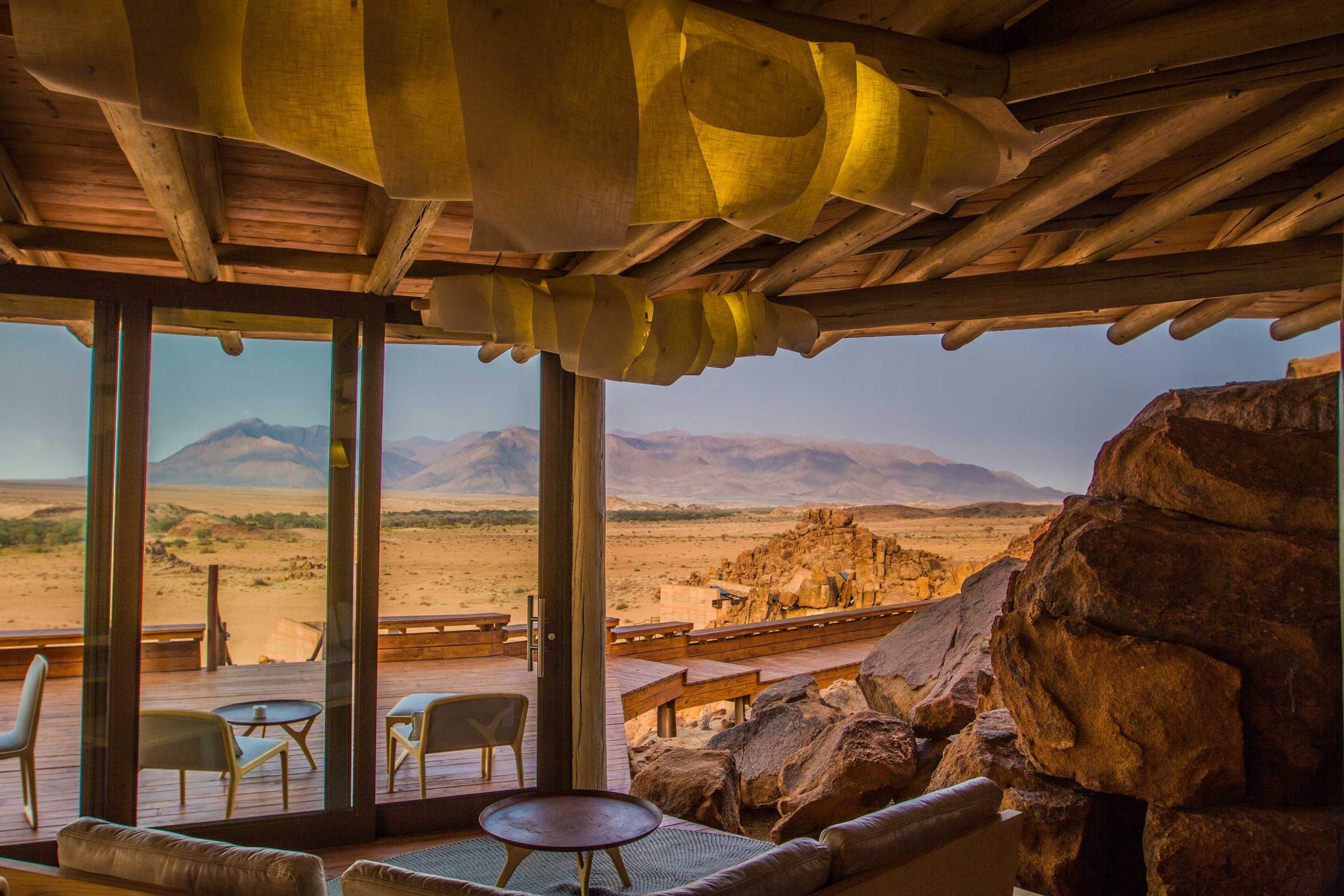
Sorris Sorris Lodge
Overlooking the Brandberg Massif, Sorris Sorris is probably the most luxurious lodge in southern Damaraland.
When to go to Damaraland
Our month by month guide: What it's like to visit Vingerklip Lodge in Damaraland
Jan
Feb
Mar
Apr
May
Jun
Jul
Aug
Sep
Oct
Nov
Dec
Damaraland in January
In Damaraland, January marks the start of the rainy season. The rains, though often light and localised, bring life to the desert landscape.
At Twyfelfontein, the rock engravings glisten after sporadic showers. Some days are clear and hot, with temperatures around 30°C/86°F, while others see dramatic thunderstorms. These can create flash floods in ephemeral riverbeds like the Ugab, temporarily transforming the arid terrain. The greening landscape provides a refreshing backdrop for the ancient rock art at Brandberg Mountain.
Many birds in the region are in full breeding plumage, with migrant species adding to the variety. Wildlife, including the desert-adapted elephants, disperses across the rejuvenated landscape, making sightings more challenging, but rewarding. The Damara Living Museum offers insights into how local communities adapt to these seasonal changes.
- Variable weather: hot, dry or humid with rain
- Occasional localised thunderstorms
- Wildlife dispersed, harder to spot
- Stark mountains against atmospheric skies
- Few tourists, low rates at accommodations
Our view
This is not a great time to visit
Weather in January
Damaraland in February
February is typically the wettest month in Damaraland, though rainfall remains patchy across this predominantly arid region.
The Spitzkoppe granite peaks against thunderous, atmospheric skies create dramatic vistas for photographers. Some days are clear and hot, while others see afternoon thunderstorms that briefly but dramatically charge the landscape. These rains can make travel more challenging, especially to remote sites like the Epupa Falls. However, the landscape feels vibrant and alive, with insects and smaller animals more easily spotted, and seasonal flowers blooming. Many birds and animals are raising their young, offering unique wildlife viewing opportunities.
Despite the rains, the rock art at Twyfelfontein and the Petrified Forest remain accessible.
- Hot and humid with occasional rain showers
- Thunderstorms meander over the landscape
- Birdlife spectacular, migrant species present
- Wildlife harder to see, but landscape lush
- Low tourist numbers, great for solitude
Our view
This is not a great time to visit
Weather in February
Damaraland in March
March in Damaraland usually sees the main rains tailing off, though precipitation varies greatly across the region. Many days are clear, with strong sun driving temperatures up, while others may experience light rainfall.
The landscape often appears vivid and green, providing a striking contrast to the bare rocky outcrops of Spitzkoppe and Brandberg. Animals such as springbok and mountain zebra may be finishing raising their young. Small herds of plains game such as these can be more visible against the greener backdrop. The Damara Living Museum showcases how local communities adapt to these seasonal changes. The clearer skies towards the end of the month make for excellent stargazing at lodges where you can move your bed to sleep under the stars.
- Weather becoming drier as month progresses
- Animals looking healthy after months of plenty
- Balmy nights sleeping under star-filled skies
- Migrant birds begin to depart
- Few tourists, rates often low at lodges
Our view
A good time to visit, with pros & cons
Weather in March
Damaraland in April
April in Damaraland is typically dominated by dry weather, with decreasing chances of rain. Temperatures begin to fall, but days remain pleasantly warm. The rains often leave the landscape verdant, creating stunning photo opportunities at sites like the Etendeka Plateau and Klip Valley.
Animals are in fantastic condition, often with fast-growing young in attendance. The desert-adapted elephants may be more easily spotted as they begin to return to the riverbeds to feed on Ana and Camelthorn trees. With dust washed from the atmosphere, photographers can capture clear shots of spectacular landscapes. Stargazers will enjoy increasingly clear night skies. In the Palmwag Concession, water and food remain in plentiful supply, so finding mammals such as black rhino can still be challenging, but worth the effort.
- Cooler nights, days still warm and pleasant
- Landscape still green from recent rains
- Air clear, for crisp photographs
- Wildlife starting to become easier to find
- Easter sees an increase in visitors
Our view
A good time to visit, with pros & cons
Weather in April
Damaraland in May
By May, Damaraland is usually drying out fast. If rains have been good, the land remains green, especially around natural springs found in valleys and craggy rocksides. The air quality and clarity can be amazing, making this an ideal month for photography at sites like Twyfelfontein and along the remote Hoanib riverbed.
Temperatures are moderate, typically warm with crisp, clear mornings and blue skies. Evenings are cool enough to wear an extra layer. Many lodges still charge low season prices, offering good value. The combination of increasingly good wildlife sightings, beautiful landscapes, and crystal-clear air make May one of the best months to visit Damaraland. It's an excellent time to explore the region's geological wonders, such as the ancient Etendeka lava flows.
- Lovely weather: warm days, cool nights
- Landscape drying out, still some greenery
- Clear, sharp colours for photography
- Wildlife more visible along scenic riverbeds
- Low visitor numbers, moderate lodge rates
Our view
A very good time to visit
Weather in May
Damaraland in June
June sees Damaraland dry and clear, with blue, largely cloudless skies. Days are often lovely and warm, but nights can be cold, sometimes below freezing in desert areas.
Visitors should pack warm clothing for early morning nature drives to spot desert-adapted elephants or black rhinos. Most outdoor pools are too cold for swimming, except for the very dedicated. It’s a particularly good climate for walking; either short walks or perhaps a multi-day hike on the Etendeka Plateau.
Historically, June prices have been low, but Damaraland's increasing popularity means many lodges now consider it high season.
- Clear, bright days and cold nights
- Wonderful for stargazing and night walks
- Good wildlife viewing in remote wildernesses
- Hiking comfortable in cooler temperatures
- Moderate lodge rates, increasing bookings
Our view
A very good time to visit
Weather in June
Damaraland in July
July in Damaraland offers fairly warm temperatures above 20°C/68°F in the middle of the day, but often cold nights. Visitors should dress in layers and be prepared for chilly mornings and evenings.
Rain is extremely rare, and clear skies make for great photographs of the sandstone mountains in morning and evening light. As vegetation shrivels, animals gather near food and water sources, making sightings of desert-adapted wildlife more likely. Elephant herds are more regularly seen along dry riverbeds during this period.
Lodges charge high season rates, and many are booked up well in advance, especially during European school holidays.
- Dry days, clear skies, crisp cold nights
- Peak time for wildlife viewing in Damaraland
- Desert-adapted elephants more easily spotted
- Wonderfully cool for day walks and longer hikes
- High season rates, book accommodations early
Our view
A very good time to visit
Weather in July
Damaraland in August
August is the height of Damaraland's winter. Expect cloudless skies and usually warm sun during the day, but nights can drop to freezing in desert areas. Visitors should bring warm clothes for nature drives and walks in chilly mornings and evenings.
The landscape begins to change from green to golden grasses and stark hillsides. Wildlife sticks close to dry river-beds where desert-adapted elephants dig for water, creating waterholes for other animals.
The clear, dry conditions make it an excellent time for hiking and exploring geological features like the Organ Pipes and Burnt Mountain.
August is the most popular time to visit Damaraland, especially for families. Booking well in advance is essential.
- Perfect weather for outdoor activities
- Excellent wildlife viewing opportunities
- Popular time for hiking and tracking rhino on foot
- Good time for cultural experiences at Damara Living Museum
- Peak season, lodges booked up well in advance
Our view
Fantastic: the very best time to visit
Weather in August
Damaraland in September
September in Damaraland brings blue, cloudless skies and fantastic wildlife viewing. Rain is almost unheard of, and as the month progresses, days and nights quickly get warmer. Daily maximums can reach the low 30s Celsius/mid-80s Fahrenheit, though low humidity keeps it comfortable. The air becomes dustier, occasionally affecting visibility for photographers at sites like Twyfelfontein or Brandberg.
In the Palmwag Concession and along the Ugab River, animals congregate around remaining water sources, making September one of the best months for game viewing, especially for desert-adapted elephants and black rhinos, but also desert-adapted lion. It's a popular month for visitors, particularly safari enthusiasts seeking sightings of these unique sub-species.
The Himba at Khowarib provide insights into how local communities adapt to the dry season.
- Warm days, nights getting warmer
- Landscape golden brown, very photogenic
- Prime time for seeing desert-adapted wildlife
- Air can be hazy with dust
- High season rates, book well in advance
Our view
Fantastic: the very best time to visit
Weather in September
Damaraland in October
Damaraland is usually at its hottest and driest in October. Temperatures build throughout the month, with daily highs potentially exceeding 40°C/104°F towards the end. The extreme dryness, though, makes even these high temperatures bearable.
Wildlife watching is at its best, particularly in areas like the remote Palmwag Concession and along the Hoanib River. October is popular among wildlife enthusiasts, as shyer species such as brown hyena and cheetah are more regularly seen. However, dust and occasional smoke may make the air hazy, challenging landscape photographers but creating beautiful sunsets.
Visitor numbers can decrease towards the end of the month, potentially allowing for last-minute bookings at some lodges.
- Hot and dry, true desert conditions
- Wildlife congregates at remaining water
- Excellent month for photographing sunsets
- Peak tourist time, expect higher rates
- Unusual species like brown hyena more regularly seen
Our view
A very good time to visit
Weather in October
Damaraland in November
November in Damaraland is unpredictable; sometimes dry and hot, sometimes cloudier and cooler. Typically, mornings are hot and clear, with clouds gathering from the afternoon. Humidity builds, occasionally resulting in spectacular thunderstorms with convection rainfall in late afternoons. These storms are usually localised and may not reach desert areas.
Places receiving good rain, like parts of the Palmwag Concession, quickly turn green, softening the landscape. Many mammals give birth, offering unique wildlife viewing opportunities. Once rains settle in waterholes, wildlife disperses in search of food, making game viewing more challenging. However, this is an excellent time for birdwatchers, with migrant species arriving and taking on breeding plumage.
The rock art at Twyfelfontein and Brandberg can be particularly striking after light rains.
- Variable weather, possibility of rain
- New growth if rains arrive, landscape greens
- Wildlife viewing still good, with babies often born
- Shoulder season rates offer better value
- Birdlife increases with migrant arrivals
Our view
A good time to visit, with pros & cons
Weather in November
Damaraland in December
December is often a dry month between November’s short rains and the main rains in January, and is one of its hottest months. Occasional short, often spectacular thunderstorms are often highly localised and generally welcomed, clearing the air of dust and allowing plant life to flourish. This creates a green carpet across the usually arid landscape, providing food for young animals.
Wildlife, including the desert-adapted elephants, disperses widely as food is more plentiful, making game viewing in areas like the Palmwag Concession more challenging. But sightings in early December can be enjoyed and photographed at leisure often with few or no other viewers. Many birds are breeding, sporting their most colorful plumage.
Christmas and New Year fall within local summer holidays, so accommodation options can be surprisingly busy, especially in cooler areas near the coast.
- Hot days, possibility of refreshing showers
- Landscape may become green with early rains
- Good time for seeing young animals
- Desert-adapted species less concentrated
- Holiday season brings more visitors
Our view
This is not a great time to visit
Weather in December

Looking for inspiration on where to travel next?
Visit our trip chooser to explore your options and find inspiration for your perfect African adventure
Inspire me